Organizational Behavior and Team Dynamics
VerifiedAdded on 2020/11/23
|17
|5443
|88
Literature Review
AI Summary
This assignment delves into key aspects of organizational behavior, focusing on motivational theories like Maslow's Hierarchy of Needs and team dynamics using Tuckman's Team Development Model. It examines how these concepts influence employee behavior, teamwork, and leadership effectiveness within organizations.
Contribute Materials
Your contribution can guide someone’s learning journey. Share your
documents today.
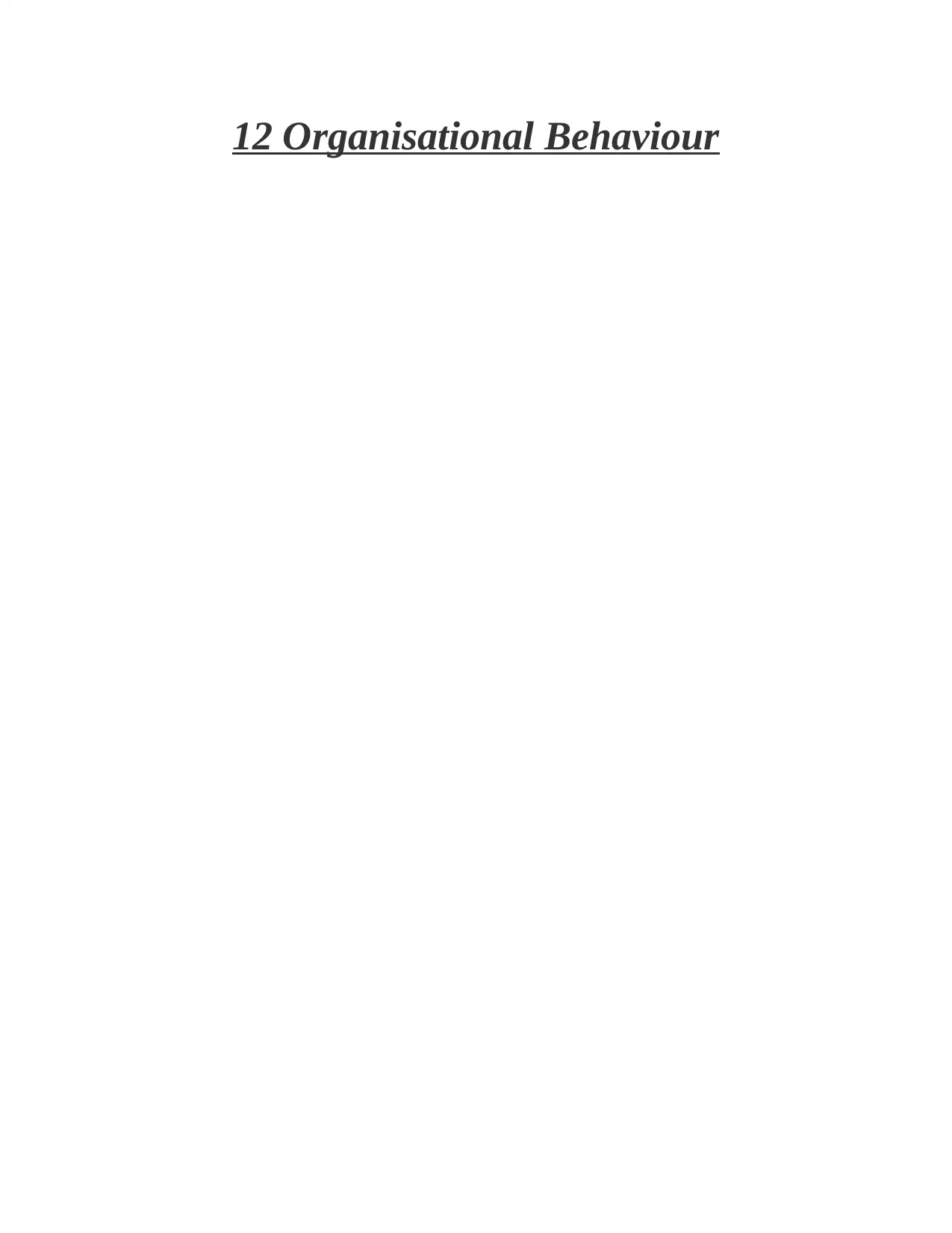
12 Organisational Behaviour
Secure Best Marks with AI Grader
Need help grading? Try our AI Grader for instant feedback on your assignments.
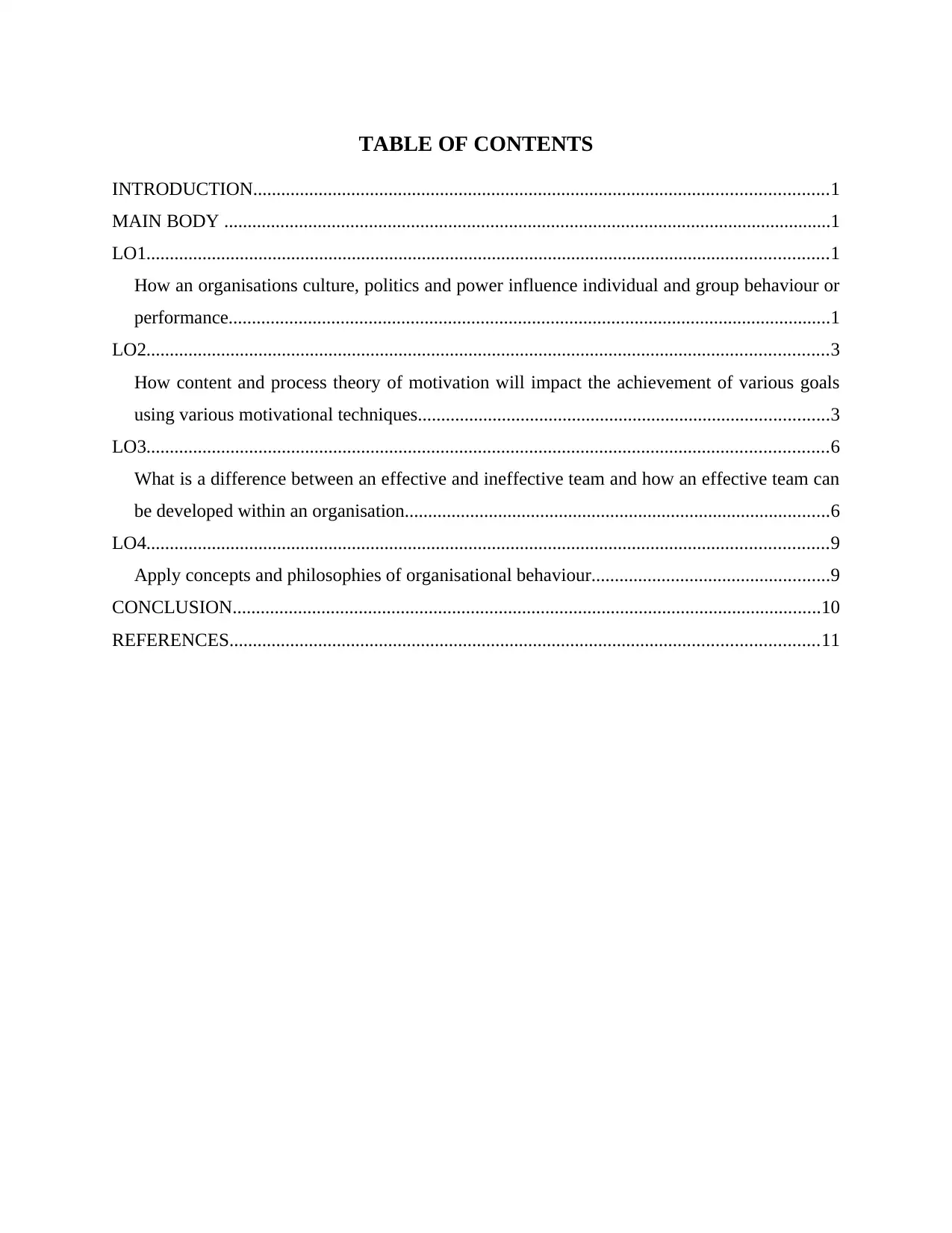
TABLE OF CONTENTS
INTRODUCTION...........................................................................................................................1
MAIN BODY ..................................................................................................................................1
LO1..................................................................................................................................................1
How an organisations culture, politics and power influence individual and group behaviour or
performance.................................................................................................................................1
LO2..................................................................................................................................................3
How content and process theory of motivation will impact the achievement of various goals
using various motivational techniques........................................................................................3
LO3..................................................................................................................................................6
What is a difference between an effective and ineffective team and how an effective team can
be developed within an organisation...........................................................................................6
LO4..................................................................................................................................................9
Apply concepts and philosophies of organisational behaviour...................................................9
CONCLUSION..............................................................................................................................10
REFERENCES..............................................................................................................................11
INTRODUCTION...........................................................................................................................1
MAIN BODY ..................................................................................................................................1
LO1..................................................................................................................................................1
How an organisations culture, politics and power influence individual and group behaviour or
performance.................................................................................................................................1
LO2..................................................................................................................................................3
How content and process theory of motivation will impact the achievement of various goals
using various motivational techniques........................................................................................3
LO3..................................................................................................................................................6
What is a difference between an effective and ineffective team and how an effective team can
be developed within an organisation...........................................................................................6
LO4..................................................................................................................................................9
Apply concepts and philosophies of organisational behaviour...................................................9
CONCLUSION..............................................................................................................................10
REFERENCES..............................................................................................................................11
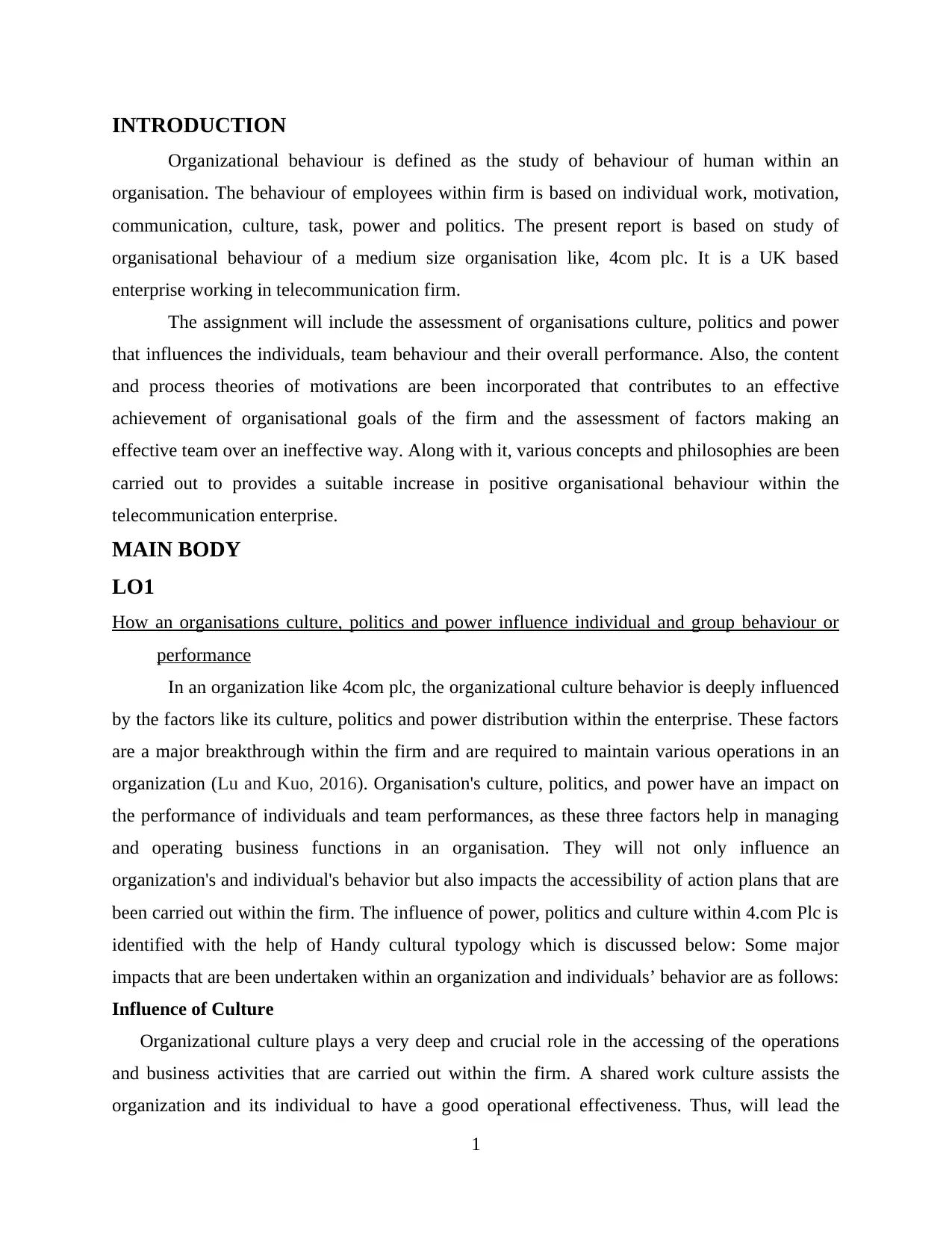
INTRODUCTION
Organizational behaviour is defined as the study of behaviour of human within an
organisation. The behaviour of employees within firm is based on individual work, motivation,
communication, culture, task, power and politics. The present report is based on study of
organisational behaviour of a medium size organisation like, 4com plc. It is a UK based
enterprise working in telecommunication firm.
The assignment will include the assessment of organisations culture, politics and power
that influences the individuals, team behaviour and their overall performance. Also, the content
and process theories of motivations are been incorporated that contributes to an effective
achievement of organisational goals of the firm and the assessment of factors making an
effective team over an ineffective way. Along with it, various concepts and philosophies are been
carried out to provides a suitable increase in positive organisational behaviour within the
telecommunication enterprise.
MAIN BODY
LO1
How an organisations culture, politics and power influence individual and group behaviour or
performance
In an organization like 4com plc, the organizational culture behavior is deeply influenced
by the factors like its culture, politics and power distribution within the enterprise. These factors
are a major breakthrough within the firm and are required to maintain various operations in an
organization (Lu and Kuo, 2016). Organisation's culture, politics, and power have an impact on
the performance of individuals and team performances, as these three factors help in managing
and operating business functions in an organisation. They will not only influence an
organization's and individual's behavior but also impacts the accessibility of action plans that are
been carried out within the firm. The influence of power, politics and culture within 4.com Plc is
identified with the help of Handy cultural typology which is discussed below: Some major
impacts that are been undertaken within an organization and individuals’ behavior are as follows:
Influence of Culture
Organizational culture plays a very deep and crucial role in the accessing of the operations
and business activities that are carried out within the firm. A shared work culture assists the
organization and its individual to have a good operational effectiveness. Thus, will lead the
1
Organizational behaviour is defined as the study of behaviour of human within an
organisation. The behaviour of employees within firm is based on individual work, motivation,
communication, culture, task, power and politics. The present report is based on study of
organisational behaviour of a medium size organisation like, 4com plc. It is a UK based
enterprise working in telecommunication firm.
The assignment will include the assessment of organisations culture, politics and power
that influences the individuals, team behaviour and their overall performance. Also, the content
and process theories of motivations are been incorporated that contributes to an effective
achievement of organisational goals of the firm and the assessment of factors making an
effective team over an ineffective way. Along with it, various concepts and philosophies are been
carried out to provides a suitable increase in positive organisational behaviour within the
telecommunication enterprise.
MAIN BODY
LO1
How an organisations culture, politics and power influence individual and group behaviour or
performance
In an organization like 4com plc, the organizational culture behavior is deeply influenced
by the factors like its culture, politics and power distribution within the enterprise. These factors
are a major breakthrough within the firm and are required to maintain various operations in an
organization (Lu and Kuo, 2016). Organisation's culture, politics, and power have an impact on
the performance of individuals and team performances, as these three factors help in managing
and operating business functions in an organisation. They will not only influence an
organization's and individual's behavior but also impacts the accessibility of action plans that are
been carried out within the firm. The influence of power, politics and culture within 4.com Plc is
identified with the help of Handy cultural typology which is discussed below: Some major
impacts that are been undertaken within an organization and individuals’ behavior are as follows:
Influence of Culture
Organizational culture plays a very deep and crucial role in the accessing of the operations
and business activities that are carried out within the firm. A shared work culture assists the
organization and its individual to have a good operational effectiveness. Thus, will lead the
1
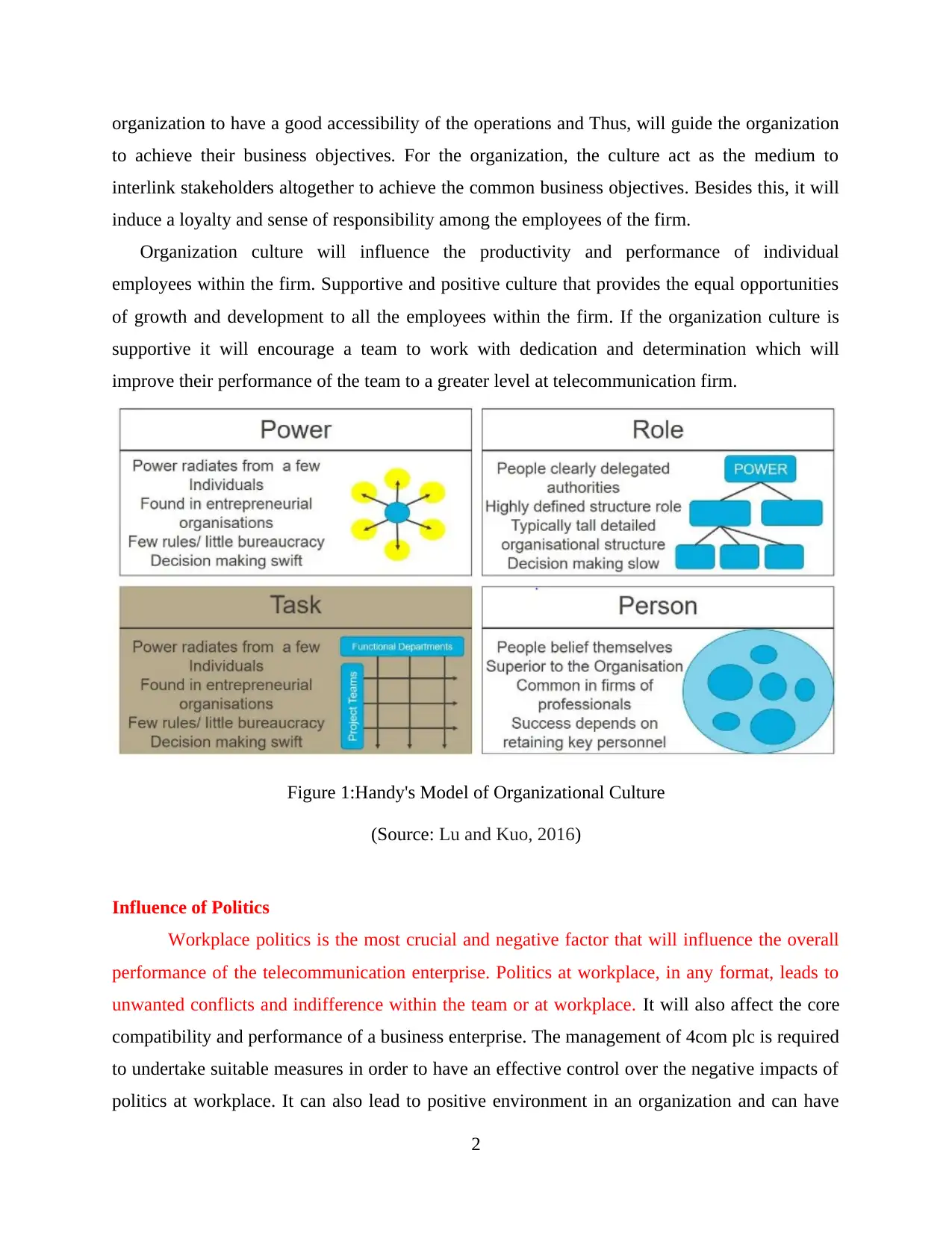
organization to have a good accessibility of the operations and Thus, will guide the organization
to achieve their business objectives. For the organization, the culture act as the medium to
interlink stakeholders altogether to achieve the common business objectives. Besides this, it will
induce a loyalty and sense of responsibility among the employees of the firm.
Organization culture will influence the productivity and performance of individual
employees within the firm. Supportive and positive culture that provides the equal opportunities
of growth and development to all the employees within the firm. If the organization culture is
supportive it will encourage a team to work with dedication and determination which will
improve their performance of the team to a greater level at telecommunication firm.
Figure 1:Handy's Model of Organizational Culture
(Source: Lu and Kuo, 2016)
Influence of Politics
Workplace politics is the most crucial and negative factor that will influence the overall
performance of the telecommunication enterprise. Politics at workplace, in any format, leads to
unwanted conflicts and indifference within the team or at workplace. It will also affect the core
compatibility and performance of a business enterprise. The management of 4com plc is required
to undertake suitable measures in order to have an effective control over the negative impacts of
politics at workplace. It can also lead to positive environment in an organization and can have
2
to achieve their business objectives. For the organization, the culture act as the medium to
interlink stakeholders altogether to achieve the common business objectives. Besides this, it will
induce a loyalty and sense of responsibility among the employees of the firm.
Organization culture will influence the productivity and performance of individual
employees within the firm. Supportive and positive culture that provides the equal opportunities
of growth and development to all the employees within the firm. If the organization culture is
supportive it will encourage a team to work with dedication and determination which will
improve their performance of the team to a greater level at telecommunication firm.
Figure 1:Handy's Model of Organizational Culture
(Source: Lu and Kuo, 2016)
Influence of Politics
Workplace politics is the most crucial and negative factor that will influence the overall
performance of the telecommunication enterprise. Politics at workplace, in any format, leads to
unwanted conflicts and indifference within the team or at workplace. It will also affect the core
compatibility and performance of a business enterprise. The management of 4com plc is required
to undertake suitable measures in order to have an effective control over the negative impacts of
politics at workplace. It can also lead to positive environment in an organization and can have
2
Secure Best Marks with AI Grader
Need help grading? Try our AI Grader for instant feedback on your assignments.
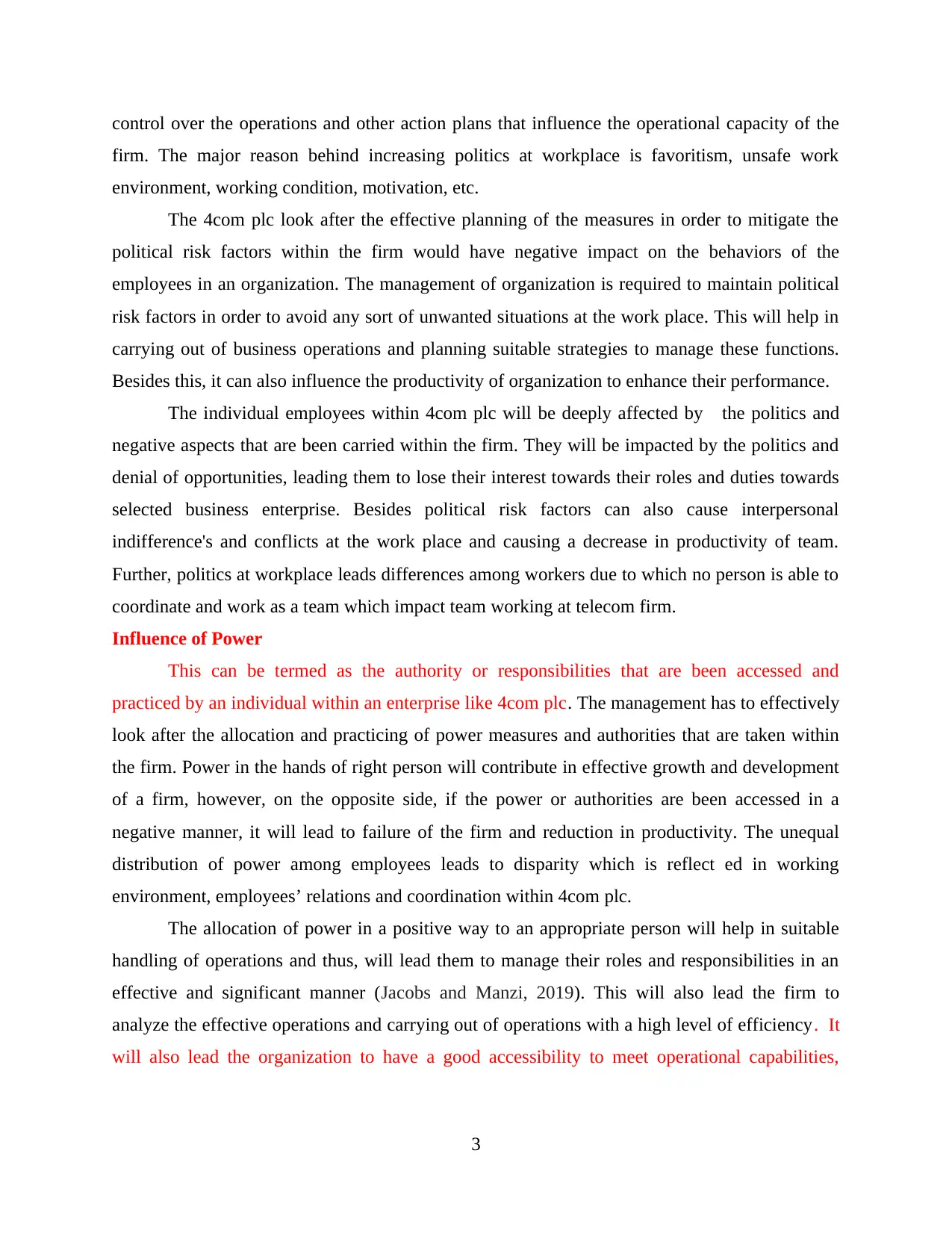
control over the operations and other action plans that influence the operational capacity of the
firm. The major reason behind increasing politics at workplace is favoritism, unsafe work
environment, working condition, motivation, etc.
The 4com plc look after the effective planning of the measures in order to mitigate the
political risk factors within the firm would have negative impact on the behaviors of the
employees in an organization. The management of organization is required to maintain political
risk factors in order to avoid any sort of unwanted situations at the work place. This will help in
carrying out of business operations and planning suitable strategies to manage these functions.
Besides this, it can also influence the productivity of organization to enhance their performance.
The individual employees within 4com plc will be deeply affected by the politics and
negative aspects that are been carried within the firm. They will be impacted by the politics and
denial of opportunities, leading them to lose their interest towards their roles and duties towards
selected business enterprise. Besides political risk factors can also cause interpersonal
indifference's and conflicts at the work place and causing a decrease in productivity of team.
Further, politics at workplace leads differences among workers due to which no person is able to
coordinate and work as a team which impact team working at telecom firm.
Influence of Power
This can be termed as the authority or responsibilities that are been accessed and
practiced by an individual within an enterprise like 4com plc. The management has to effectively
look after the allocation and practicing of power measures and authorities that are taken within
the firm. Power in the hands of right person will contribute in effective growth and development
of a firm, however, on the opposite side, if the power or authorities are been accessed in a
negative manner, it will lead to failure of the firm and reduction in productivity. The unequal
distribution of power among employees leads to disparity which is reflect ed in working
environment, employees’ relations and coordination within 4com plc.
The allocation of power in a positive way to an appropriate person will help in suitable
handling of operations and thus, will lead them to manage their roles and responsibilities in an
effective and significant manner (Jacobs and Manzi, 2019). This will also lead the firm to
analyze the effective operations and carrying out of operations with a high level of efficiency. It
will also lead the organization to have a good accessibility to meet operational capabilities,
3
firm. The major reason behind increasing politics at workplace is favoritism, unsafe work
environment, working condition, motivation, etc.
The 4com plc look after the effective planning of the measures in order to mitigate the
political risk factors within the firm would have negative impact on the behaviors of the
employees in an organization. The management of organization is required to maintain political
risk factors in order to avoid any sort of unwanted situations at the work place. This will help in
carrying out of business operations and planning suitable strategies to manage these functions.
Besides this, it can also influence the productivity of organization to enhance their performance.
The individual employees within 4com plc will be deeply affected by the politics and
negative aspects that are been carried within the firm. They will be impacted by the politics and
denial of opportunities, leading them to lose their interest towards their roles and duties towards
selected business enterprise. Besides political risk factors can also cause interpersonal
indifference's and conflicts at the work place and causing a decrease in productivity of team.
Further, politics at workplace leads differences among workers due to which no person is able to
coordinate and work as a team which impact team working at telecom firm.
Influence of Power
This can be termed as the authority or responsibilities that are been accessed and
practiced by an individual within an enterprise like 4com plc. The management has to effectively
look after the allocation and practicing of power measures and authorities that are taken within
the firm. Power in the hands of right person will contribute in effective growth and development
of a firm, however, on the opposite side, if the power or authorities are been accessed in a
negative manner, it will lead to failure of the firm and reduction in productivity. The unequal
distribution of power among employees leads to disparity which is reflect ed in working
environment, employees’ relations and coordination within 4com plc.
The allocation of power in a positive way to an appropriate person will help in suitable
handling of operations and thus, will lead them to manage their roles and responsibilities in an
effective and significant manner (Jacobs and Manzi, 2019). This will also lead the firm to
analyze the effective operations and carrying out of operations with a high level of efficiency. It
will also lead the organization to have a good accessibility to meet operational capabilities,
3
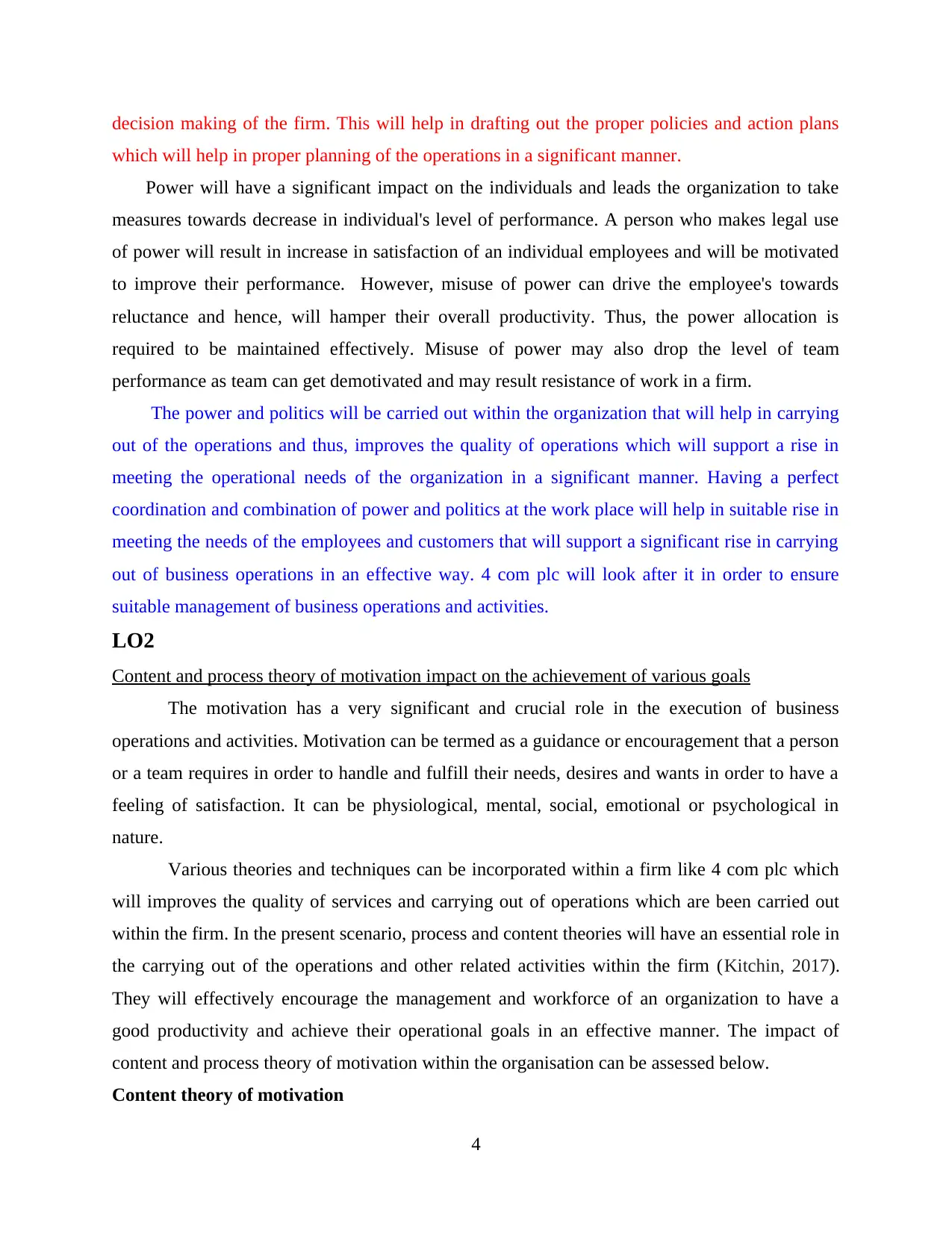
decision making of the firm. This will help in drafting out the proper policies and action plans
which will help in proper planning of the operations in a significant manner.
Power will have a significant impact on the individuals and leads the organization to take
measures towards decrease in individual's level of performance. A person who makes legal use
of power will result in increase in satisfaction of an individual employees and will be motivated
to improve their performance. However, misuse of power can drive the employee's towards
reluctance and hence, will hamper their overall productivity. Thus, the power allocation is
required to be maintained effectively. Misuse of power may also drop the level of team
performance as team can get demotivated and may result resistance of work in a firm.
The power and politics will be carried out within the organization that will help in carrying
out of the operations and thus, improves the quality of operations which will support a rise in
meeting the operational needs of the organization in a significant manner. Having a perfect
coordination and combination of power and politics at the work place will help in suitable rise in
meeting the needs of the employees and customers that will support a significant rise in carrying
out of business operations in an effective way. 4 com plc will look after it in order to ensure
suitable management of business operations and activities.
LO2
Content and process theory of motivation impact on the achievement of various goals
The motivation has a very significant and crucial role in the execution of business
operations and activities. Motivation can be termed as a guidance or encouragement that a person
or a team requires in order to handle and fulfill their needs, desires and wants in order to have a
feeling of satisfaction. It can be physiological, mental, social, emotional or psychological in
nature.
Various theories and techniques can be incorporated within a firm like 4 com plc which
will improves the quality of services and carrying out of operations which are been carried out
within the firm. In the present scenario, process and content theories will have an essential role in
the carrying out of the operations and other related activities within the firm (Kitchin, 2017).
They will effectively encourage the management and workforce of an organization to have a
good productivity and achieve their operational goals in an effective manner. The impact of
content and process theory of motivation within the organisation can be assessed below.
Content theory of motivation
4
which will help in proper planning of the operations in a significant manner.
Power will have a significant impact on the individuals and leads the organization to take
measures towards decrease in individual's level of performance. A person who makes legal use
of power will result in increase in satisfaction of an individual employees and will be motivated
to improve their performance. However, misuse of power can drive the employee's towards
reluctance and hence, will hamper their overall productivity. Thus, the power allocation is
required to be maintained effectively. Misuse of power may also drop the level of team
performance as team can get demotivated and may result resistance of work in a firm.
The power and politics will be carried out within the organization that will help in carrying
out of the operations and thus, improves the quality of operations which will support a rise in
meeting the operational needs of the organization in a significant manner. Having a perfect
coordination and combination of power and politics at the work place will help in suitable rise in
meeting the needs of the employees and customers that will support a significant rise in carrying
out of business operations in an effective way. 4 com plc will look after it in order to ensure
suitable management of business operations and activities.
LO2
Content and process theory of motivation impact on the achievement of various goals
The motivation has a very significant and crucial role in the execution of business
operations and activities. Motivation can be termed as a guidance or encouragement that a person
or a team requires in order to handle and fulfill their needs, desires and wants in order to have a
feeling of satisfaction. It can be physiological, mental, social, emotional or psychological in
nature.
Various theories and techniques can be incorporated within a firm like 4 com plc which
will improves the quality of services and carrying out of operations which are been carried out
within the firm. In the present scenario, process and content theories will have an essential role in
the carrying out of the operations and other related activities within the firm (Kitchin, 2017).
They will effectively encourage the management and workforce of an organization to have a
good productivity and achieve their operational goals in an effective manner. The impact of
content and process theory of motivation within the organisation can be assessed below.
Content theory of motivation
4
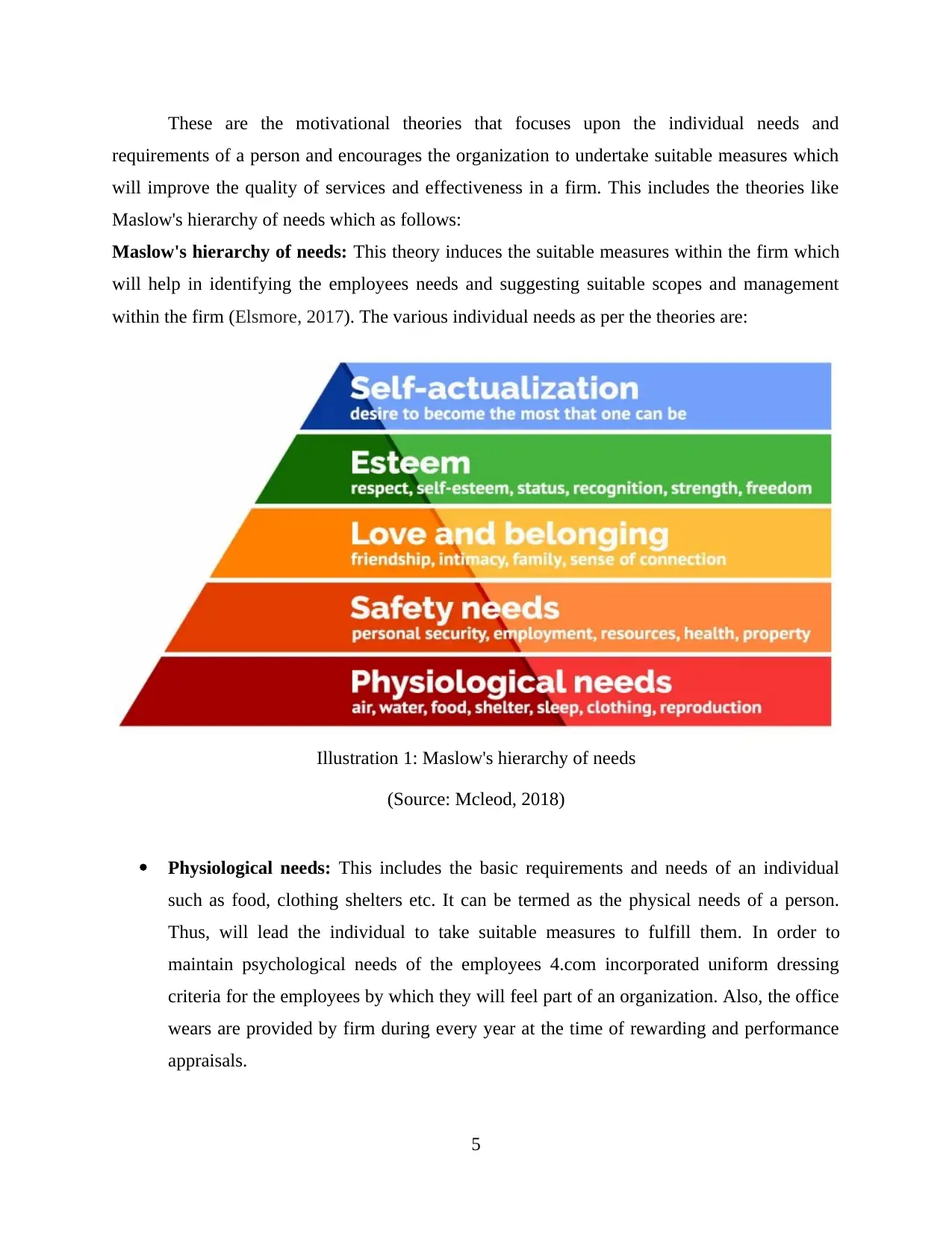
These are the motivational theories that focuses upon the individual needs and
requirements of a person and encourages the organization to undertake suitable measures which
will improve the quality of services and effectiveness in a firm. This includes the theories like
Maslow's hierarchy of needs which as follows:
Maslow's hierarchy of needs: This theory induces the suitable measures within the firm which
will help in identifying the employees needs and suggesting suitable scopes and management
within the firm (Elsmore, 2017). The various individual needs as per the theories are:
Physiological needs: This includes the basic requirements and needs of an individual
such as food, clothing shelters etc. It can be termed as the physical needs of a person.
Thus, will lead the individual to take suitable measures to fulfill them. In order to
maintain psychological needs of the employees 4.com incorporated uniform dressing
criteria for the employees by which they will feel part of an organization. Also, the office
wears are provided by firm during every year at the time of rewarding and performance
appraisals.
5
Illustration 1: Maslow's hierarchy of needs
(Source: Mcleod, 2018)
requirements of a person and encourages the organization to undertake suitable measures which
will improve the quality of services and effectiveness in a firm. This includes the theories like
Maslow's hierarchy of needs which as follows:
Maslow's hierarchy of needs: This theory induces the suitable measures within the firm which
will help in identifying the employees needs and suggesting suitable scopes and management
within the firm (Elsmore, 2017). The various individual needs as per the theories are:
Physiological needs: This includes the basic requirements and needs of an individual
such as food, clothing shelters etc. It can be termed as the physical needs of a person.
Thus, will lead the individual to take suitable measures to fulfill them. In order to
maintain psychological needs of the employees 4.com incorporated uniform dressing
criteria for the employees by which they will feel part of an organization. Also, the office
wears are provided by firm during every year at the time of rewarding and performance
appraisals.
5
Illustration 1: Maslow's hierarchy of needs
(Source: Mcleod, 2018)
Paraphrase This Document
Need a fresh take? Get an instant paraphrase of this document with our AI Paraphraser
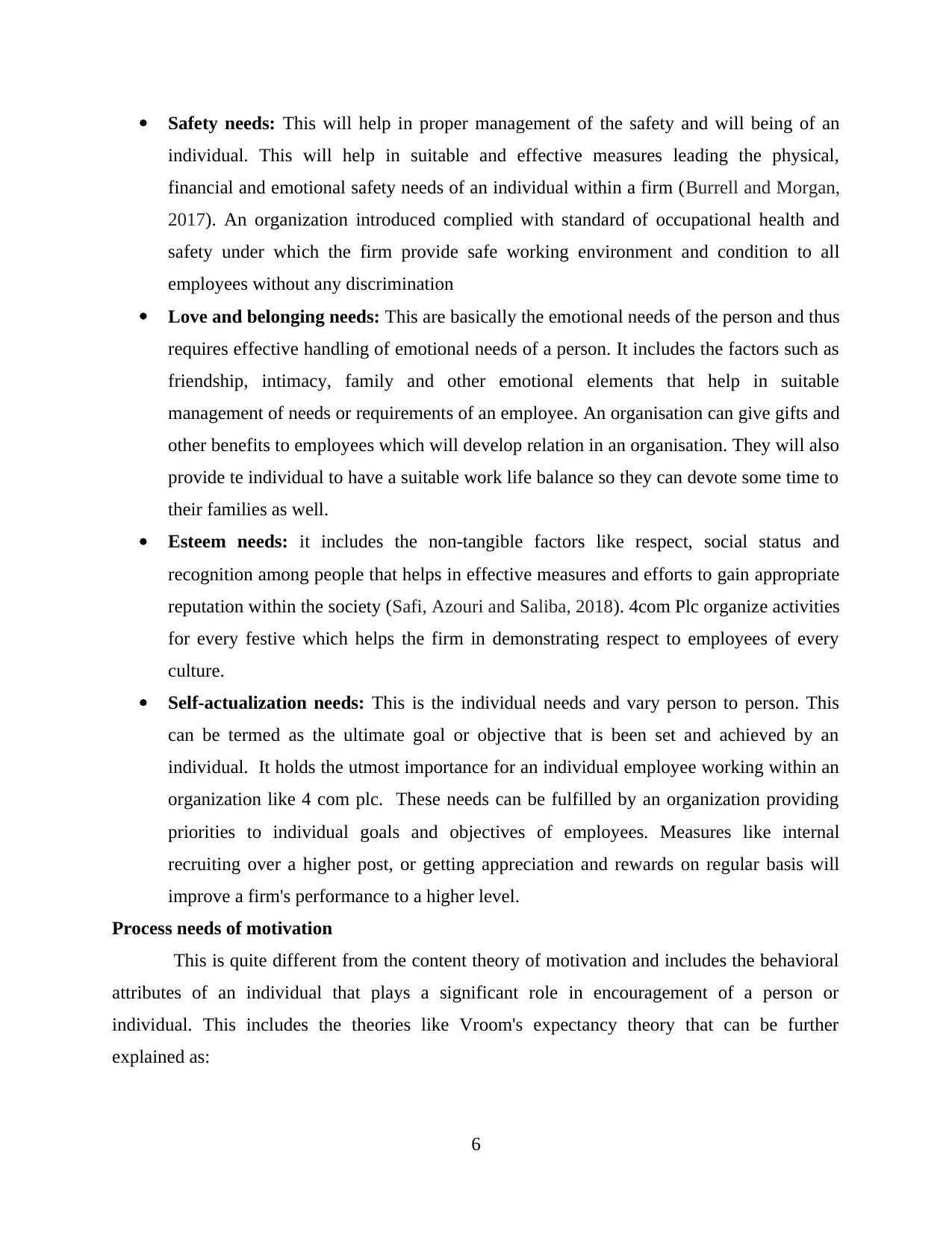
Safety needs: This will help in proper management of the safety and will being of an
individual. This will help in suitable and effective measures leading the physical,
financial and emotional safety needs of an individual within a firm (Burrell and Morgan,
2017). An organization introduced complied with standard of occupational health and
safety under which the firm provide safe working environment and condition to all
employees without any discrimination
Love and belonging needs: This are basically the emotional needs of the person and thus
requires effective handling of emotional needs of a person. It includes the factors such as
friendship, intimacy, family and other emotional elements that help in suitable
management of needs or requirements of an employee. An organisation can give gifts and
other benefits to employees which will develop relation in an organisation. They will also
provide te individual to have a suitable work life balance so they can devote some time to
their families as well.
Esteem needs: it includes the non-tangible factors like respect, social status and
recognition among people that helps in effective measures and efforts to gain appropriate
reputation within the society (Safi, Azouri and Saliba, 2018). 4com Plc organize activities
for every festive which helps the firm in demonstrating respect to employees of every
culture.
Self-actualization needs: This is the individual needs and vary person to person. This
can be termed as the ultimate goal or objective that is been set and achieved by an
individual. It holds the utmost importance for an individual employee working within an
organization like 4 com plc. These needs can be fulfilled by an organization providing
priorities to individual goals and objectives of employees. Measures like internal
recruiting over a higher post, or getting appreciation and rewards on regular basis will
improve a firm's performance to a higher level.
Process needs of motivation
This is quite different from the content theory of motivation and includes the behavioral
attributes of an individual that plays a significant role in encouragement of a person or
individual. This includes the theories like Vroom's expectancy theory that can be further
explained as:
6
individual. This will help in suitable and effective measures leading the physical,
financial and emotional safety needs of an individual within a firm (Burrell and Morgan,
2017). An organization introduced complied with standard of occupational health and
safety under which the firm provide safe working environment and condition to all
employees without any discrimination
Love and belonging needs: This are basically the emotional needs of the person and thus
requires effective handling of emotional needs of a person. It includes the factors such as
friendship, intimacy, family and other emotional elements that help in suitable
management of needs or requirements of an employee. An organisation can give gifts and
other benefits to employees which will develop relation in an organisation. They will also
provide te individual to have a suitable work life balance so they can devote some time to
their families as well.
Esteem needs: it includes the non-tangible factors like respect, social status and
recognition among people that helps in effective measures and efforts to gain appropriate
reputation within the society (Safi, Azouri and Saliba, 2018). 4com Plc organize activities
for every festive which helps the firm in demonstrating respect to employees of every
culture.
Self-actualization needs: This is the individual needs and vary person to person. This
can be termed as the ultimate goal or objective that is been set and achieved by an
individual. It holds the utmost importance for an individual employee working within an
organization like 4 com plc. These needs can be fulfilled by an organization providing
priorities to individual goals and objectives of employees. Measures like internal
recruiting over a higher post, or getting appreciation and rewards on regular basis will
improve a firm's performance to a higher level.
Process needs of motivation
This is quite different from the content theory of motivation and includes the behavioral
attributes of an individual that plays a significant role in encouragement of a person or
individual. This includes the theories like Vroom's expectancy theory that can be further
explained as:
6
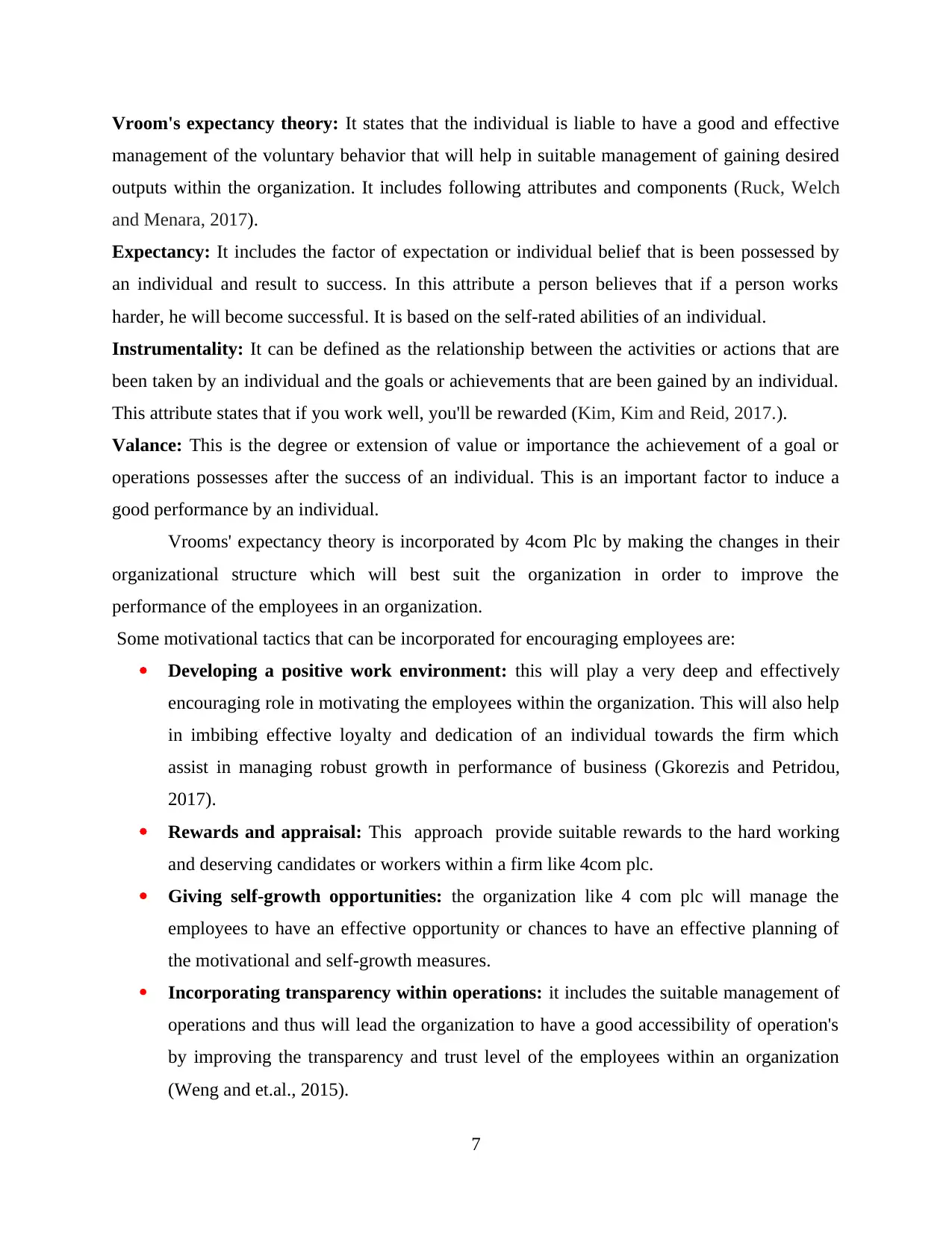
Vroom's expectancy theory: It states that the individual is liable to have a good and effective
management of the voluntary behavior that will help in suitable management of gaining desired
outputs within the organization. It includes following attributes and components (Ruck, Welch
and Menara, 2017).
Expectancy: It includes the factor of expectation or individual belief that is been possessed by
an individual and result to success. In this attribute a person believes that if a person works
harder, he will become successful. It is based on the self-rated abilities of an individual.
Instrumentality: It can be defined as the relationship between the activities or actions that are
been taken by an individual and the goals or achievements that are been gained by an individual.
This attribute states that if you work well, you'll be rewarded (Kim, Kim and Reid, 2017.).
Valance: This is the degree or extension of value or importance the achievement of a goal or
operations possesses after the success of an individual. This is an important factor to induce a
good performance by an individual.
Vrooms' expectancy theory is incorporated by 4com Plc by making the changes in their
organizational structure which will best suit the organization in order to improve the
performance of the employees in an organization.
Some motivational tactics that can be incorporated for encouraging employees are:
Developing a positive work environment: this will play a very deep and effectively
encouraging role in motivating the employees within the organization. This will also help
in imbibing effective loyalty and dedication of an individual towards the firm which
assist in managing robust growth in performance of business (Gkorezis and Petridou,
2017).
Rewards and appraisal: This approach provide suitable rewards to the hard working
and deserving candidates or workers within a firm like 4com plc.
Giving self-growth opportunities: the organization like 4 com plc will manage the
employees to have an effective opportunity or chances to have an effective planning of
the motivational and self-growth measures.
Incorporating transparency within operations: it includes the suitable management of
operations and thus will lead the organization to have a good accessibility of operation's
by improving the transparency and trust level of the employees within an organization
(Weng and et.al., 2015).
7
management of the voluntary behavior that will help in suitable management of gaining desired
outputs within the organization. It includes following attributes and components (Ruck, Welch
and Menara, 2017).
Expectancy: It includes the factor of expectation or individual belief that is been possessed by
an individual and result to success. In this attribute a person believes that if a person works
harder, he will become successful. It is based on the self-rated abilities of an individual.
Instrumentality: It can be defined as the relationship between the activities or actions that are
been taken by an individual and the goals or achievements that are been gained by an individual.
This attribute states that if you work well, you'll be rewarded (Kim, Kim and Reid, 2017.).
Valance: This is the degree or extension of value or importance the achievement of a goal or
operations possesses after the success of an individual. This is an important factor to induce a
good performance by an individual.
Vrooms' expectancy theory is incorporated by 4com Plc by making the changes in their
organizational structure which will best suit the organization in order to improve the
performance of the employees in an organization.
Some motivational tactics that can be incorporated for encouraging employees are:
Developing a positive work environment: this will play a very deep and effectively
encouraging role in motivating the employees within the organization. This will also help
in imbibing effective loyalty and dedication of an individual towards the firm which
assist in managing robust growth in performance of business (Gkorezis and Petridou,
2017).
Rewards and appraisal: This approach provide suitable rewards to the hard working
and deserving candidates or workers within a firm like 4com plc.
Giving self-growth opportunities: the organization like 4 com plc will manage the
employees to have an effective opportunity or chances to have an effective planning of
the motivational and self-growth measures.
Incorporating transparency within operations: it includes the suitable management of
operations and thus will lead the organization to have a good accessibility of operation's
by improving the transparency and trust level of the employees within an organization
(Weng and et.al., 2015).
7
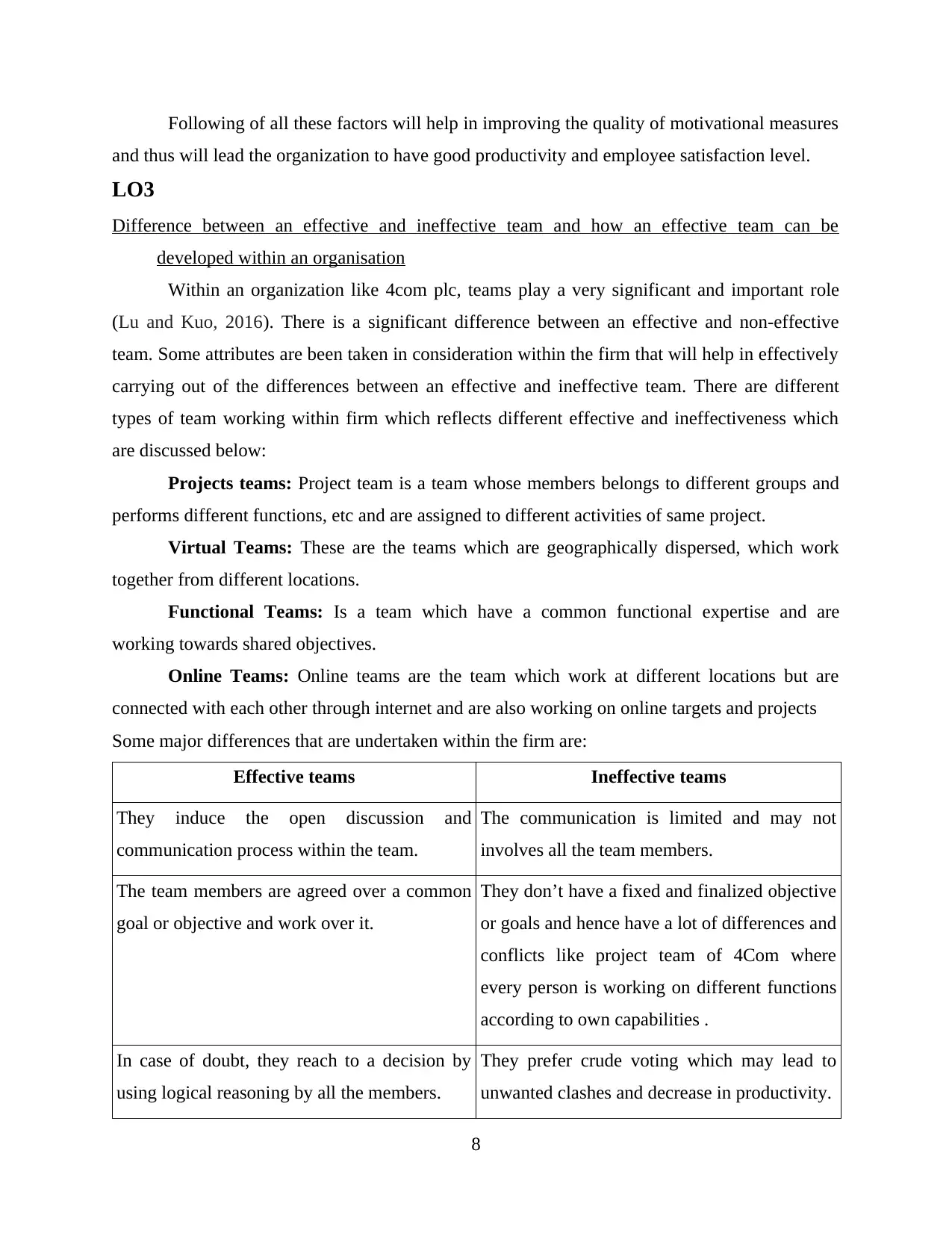
Following of all these factors will help in improving the quality of motivational measures
and thus will lead the organization to have good productivity and employee satisfaction level.
LO3
Difference between an effective and ineffective team and how an effective team can be
developed within an organisation
Within an organization like 4com plc, teams play a very significant and important role
(Lu and Kuo, 2016). There is a significant difference between an effective and non-effective
team. Some attributes are been taken in consideration within the firm that will help in effectively
carrying out of the differences between an effective and ineffective team. There are different
types of team working within firm which reflects different effective and ineffectiveness which
are discussed below:
Projects teams: Project team is a team whose members belongs to different groups and
performs different functions, etc and are assigned to different activities of same project.
Virtual Teams: These are the teams which are geographically dispersed, which work
together from different locations.
Functional Teams: Is a team which have a common functional expertise and are
working towards shared objectives.
Online Teams: Online teams are the team which work at different locations but are
connected with each other through internet and are also working on online targets and projects
Some major differences that are undertaken within the firm are:
Effective teams Ineffective teams
They induce the open discussion and
communication process within the team.
The communication is limited and may not
involves all the team members.
The team members are agreed over a common
goal or objective and work over it.
They don’t have a fixed and finalized objective
or goals and hence have a lot of differences and
conflicts like project team of 4Com where
every person is working on different functions
according to own capabilities .
In case of doubt, they reach to a decision by
using logical reasoning by all the members.
They prefer crude voting which may lead to
unwanted clashes and decrease in productivity.
8
and thus will lead the organization to have good productivity and employee satisfaction level.
LO3
Difference between an effective and ineffective team and how an effective team can be
developed within an organisation
Within an organization like 4com plc, teams play a very significant and important role
(Lu and Kuo, 2016). There is a significant difference between an effective and non-effective
team. Some attributes are been taken in consideration within the firm that will help in effectively
carrying out of the differences between an effective and ineffective team. There are different
types of team working within firm which reflects different effective and ineffectiveness which
are discussed below:
Projects teams: Project team is a team whose members belongs to different groups and
performs different functions, etc and are assigned to different activities of same project.
Virtual Teams: These are the teams which are geographically dispersed, which work
together from different locations.
Functional Teams: Is a team which have a common functional expertise and are
working towards shared objectives.
Online Teams: Online teams are the team which work at different locations but are
connected with each other through internet and are also working on online targets and projects
Some major differences that are undertaken within the firm are:
Effective teams Ineffective teams
They induce the open discussion and
communication process within the team.
The communication is limited and may not
involves all the team members.
The team members are agreed over a common
goal or objective and work over it.
They don’t have a fixed and finalized objective
or goals and hence have a lot of differences and
conflicts like project team of 4Com where
every person is working on different functions
according to own capabilities .
In case of doubt, they reach to a decision by
using logical reasoning by all the members.
They prefer crude voting which may lead to
unwanted clashes and decrease in productivity.
8
Secure Best Marks with AI Grader
Need help grading? Try our AI Grader for instant feedback on your assignments.
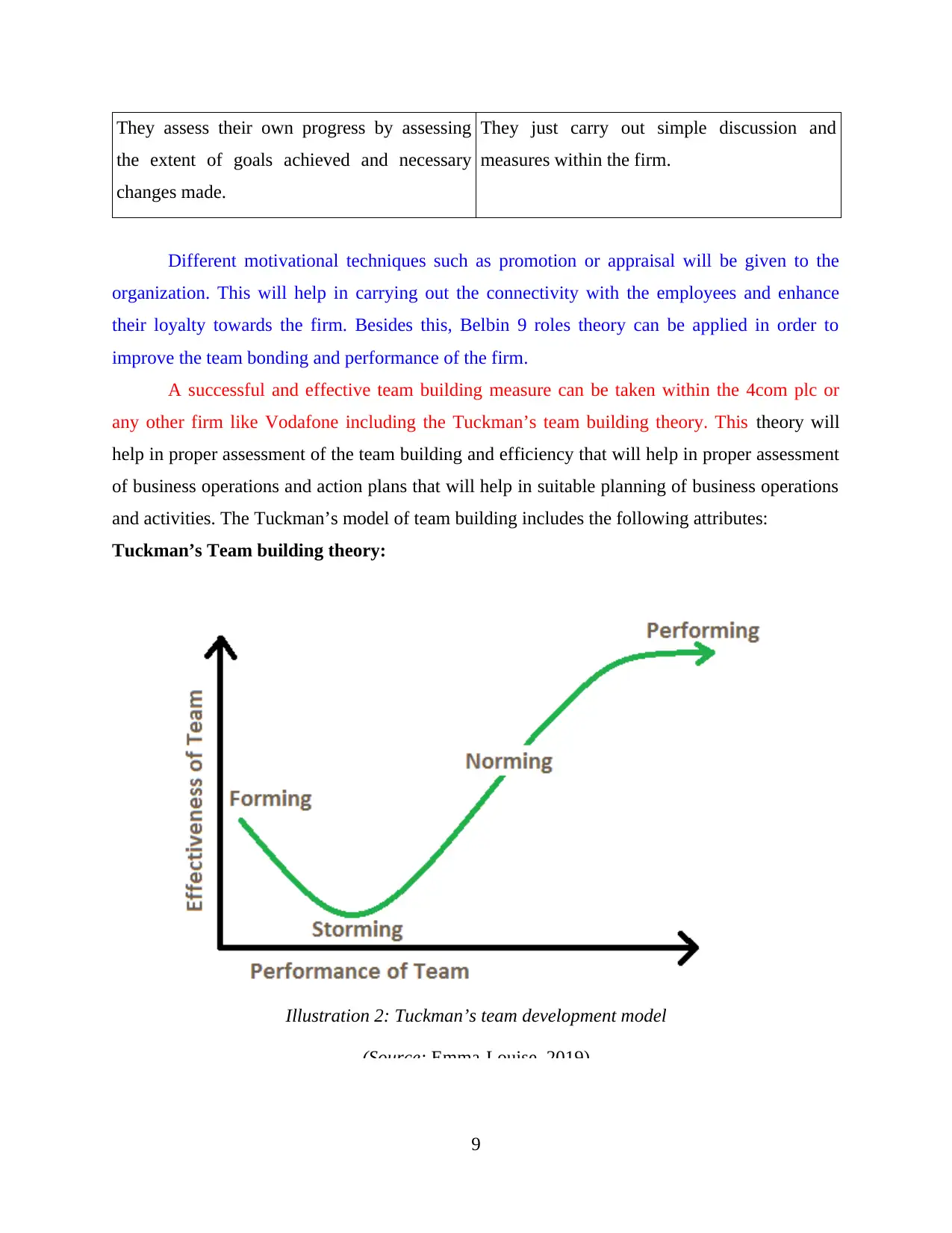
They assess their own progress by assessing
the extent of goals achieved and necessary
changes made.
They just carry out simple discussion and
measures within the firm.
Different motivational techniques such as promotion or appraisal will be given to the
organization. This will help in carrying out the connectivity with the employees and enhance
their loyalty towards the firm. Besides this, Belbin 9 roles theory can be applied in order to
improve the team bonding and performance of the firm.
A successful and effective team building measure can be taken within the 4com plc or
any other firm like Vodafone including the Tuckman’s team building theory. This theory will
help in proper assessment of the team building and efficiency that will help in proper assessment
of business operations and action plans that will help in suitable planning of business operations
and activities. The Tuckman’s model of team building includes the following attributes:
Tuckman’s Team building theory:
9
Illustration 2: Tuckman’s team development model
(Source: Emma-Louise, 2019)
the extent of goals achieved and necessary
changes made.
They just carry out simple discussion and
measures within the firm.
Different motivational techniques such as promotion or appraisal will be given to the
organization. This will help in carrying out the connectivity with the employees and enhance
their loyalty towards the firm. Besides this, Belbin 9 roles theory can be applied in order to
improve the team bonding and performance of the firm.
A successful and effective team building measure can be taken within the 4com plc or
any other firm like Vodafone including the Tuckman’s team building theory. This theory will
help in proper assessment of the team building and efficiency that will help in proper assessment
of business operations and action plans that will help in suitable planning of business operations
and activities. The Tuckman’s model of team building includes the following attributes:
Tuckman’s Team building theory:
9
Illustration 2: Tuckman’s team development model
(Source: Emma-Louise, 2019)
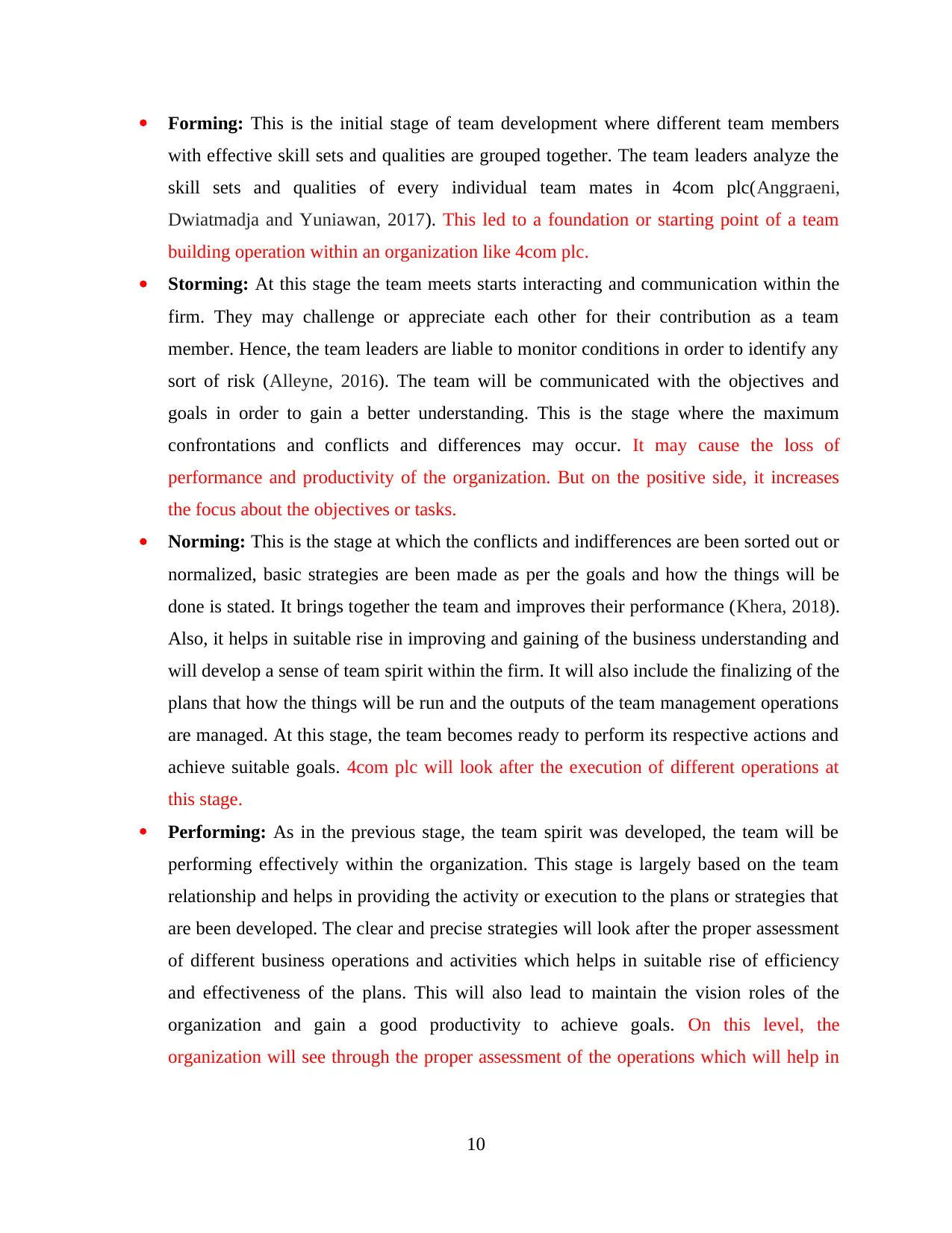
Forming: This is the initial stage of team development where different team members
with effective skill sets and qualities are grouped together. The team leaders analyze the
skill sets and qualities of every individual team mates in 4com plc(Anggraeni,
Dwiatmadja and Yuniawan, 2017). This led to a foundation or starting point of a team
building operation within an organization like 4com plc.
Storming: At this stage the team meets starts interacting and communication within the
firm. They may challenge or appreciate each other for their contribution as a team
member. Hence, the team leaders are liable to monitor conditions in order to identify any
sort of risk (Alleyne, 2016). The team will be communicated with the objectives and
goals in order to gain a better understanding. This is the stage where the maximum
confrontations and conflicts and differences may occur. It may cause the loss of
performance and productivity of the organization. But on the positive side, it increases
the focus about the objectives or tasks.
Norming: This is the stage at which the conflicts and indifferences are been sorted out or
normalized, basic strategies are been made as per the goals and how the things will be
done is stated. It brings together the team and improves their performance (Khera, 2018).
Also, it helps in suitable rise in improving and gaining of the business understanding and
will develop a sense of team spirit within the firm. It will also include the finalizing of the
plans that how the things will be run and the outputs of the team management operations
are managed. At this stage, the team becomes ready to perform its respective actions and
achieve suitable goals. 4com plc will look after the execution of different operations at
this stage.
Performing: As in the previous stage, the team spirit was developed, the team will be
performing effectively within the organization. This stage is largely based on the team
relationship and helps in providing the activity or execution to the plans or strategies that
are been developed. The clear and precise strategies will look after the proper assessment
of different business operations and activities which helps in suitable rise of efficiency
and effectiveness of the plans. This will also lead to maintain the vision roles of the
organization and gain a good productivity to achieve goals. On this level, the
organization will see through the proper assessment of the operations which will help in
10
with effective skill sets and qualities are grouped together. The team leaders analyze the
skill sets and qualities of every individual team mates in 4com plc(Anggraeni,
Dwiatmadja and Yuniawan, 2017). This led to a foundation or starting point of a team
building operation within an organization like 4com plc.
Storming: At this stage the team meets starts interacting and communication within the
firm. They may challenge or appreciate each other for their contribution as a team
member. Hence, the team leaders are liable to monitor conditions in order to identify any
sort of risk (Alleyne, 2016). The team will be communicated with the objectives and
goals in order to gain a better understanding. This is the stage where the maximum
confrontations and conflicts and differences may occur. It may cause the loss of
performance and productivity of the organization. But on the positive side, it increases
the focus about the objectives or tasks.
Norming: This is the stage at which the conflicts and indifferences are been sorted out or
normalized, basic strategies are been made as per the goals and how the things will be
done is stated. It brings together the team and improves their performance (Khera, 2018).
Also, it helps in suitable rise in improving and gaining of the business understanding and
will develop a sense of team spirit within the firm. It will also include the finalizing of the
plans that how the things will be run and the outputs of the team management operations
are managed. At this stage, the team becomes ready to perform its respective actions and
achieve suitable goals. 4com plc will look after the execution of different operations at
this stage.
Performing: As in the previous stage, the team spirit was developed, the team will be
performing effectively within the organization. This stage is largely based on the team
relationship and helps in providing the activity or execution to the plans or strategies that
are been developed. The clear and precise strategies will look after the proper assessment
of different business operations and activities which helps in suitable rise of efficiency
and effectiveness of the plans. This will also lead to maintain the vision roles of the
organization and gain a good productivity to achieve goals. On this level, the
organization will see through the proper assessment of the operations which will help in
10
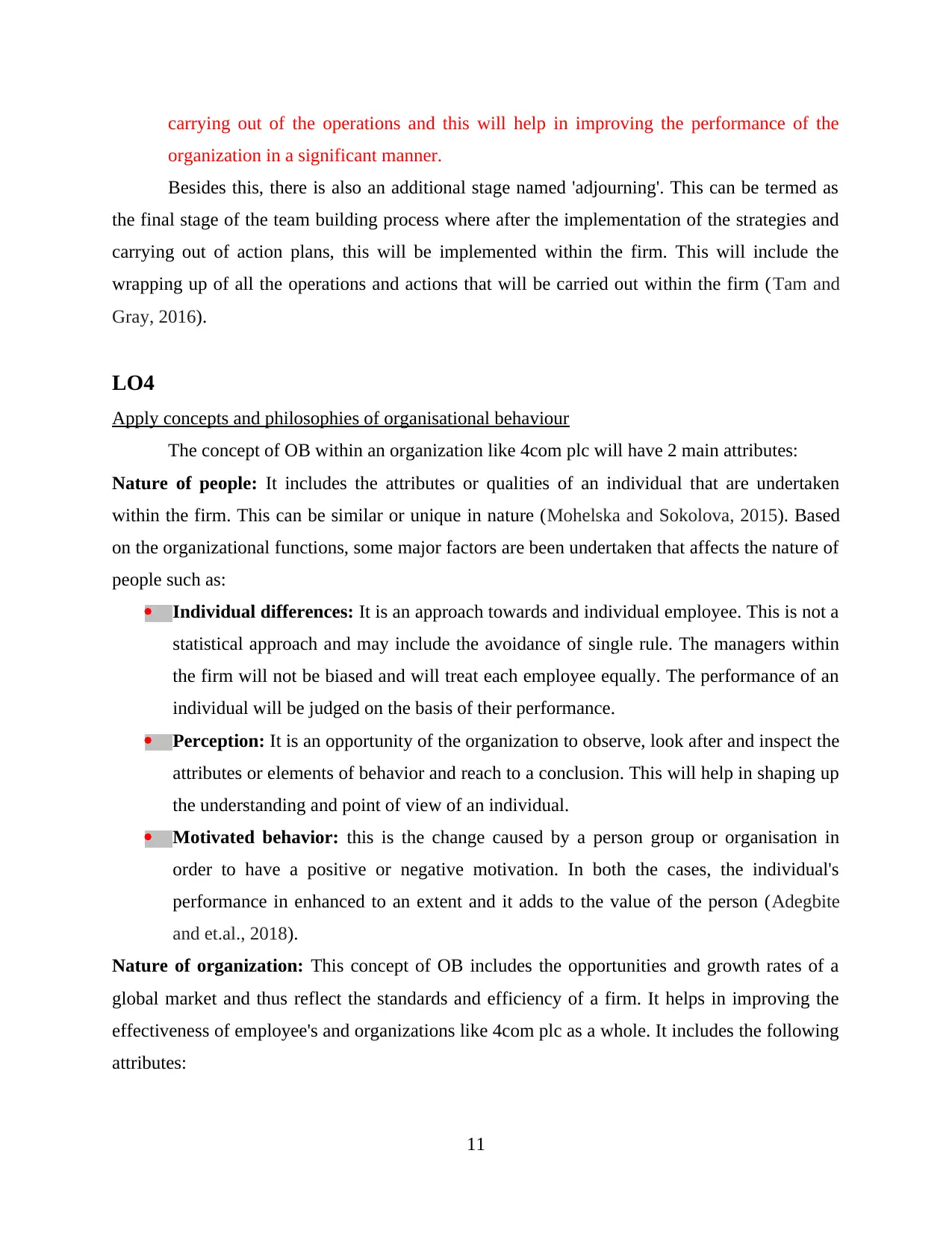
carrying out of the operations and this will help in improving the performance of the
organization in a significant manner.
Besides this, there is also an additional stage named 'adjourning'. This can be termed as
the final stage of the team building process where after the implementation of the strategies and
carrying out of action plans, this will be implemented within the firm. This will include the
wrapping up of all the operations and actions that will be carried out within the firm (Tam and
Gray, 2016).
LO4
Apply concepts and philosophies of organisational behaviour
The concept of OB within an organization like 4com plc will have 2 main attributes:
Nature of people: It includes the attributes or qualities of an individual that are undertaken
within the firm. This can be similar or unique in nature (Mohelska and Sokolova, 2015). Based
on the organizational functions, some major factors are been undertaken that affects the nature of
people such as:
Individual differences: It is an approach towards and individual employee. This is not a
statistical approach and may include the avoidance of single rule. The managers within
the firm will not be biased and will treat each employee equally. The performance of an
individual will be judged on the basis of their performance.
Perception: It is an opportunity of the organization to observe, look after and inspect the
attributes or elements of behavior and reach to a conclusion. This will help in shaping up
the understanding and point of view of an individual.
Motivated behavior: this is the change caused by a person group or organisation in
order to have a positive or negative motivation. In both the cases, the individual's
performance in enhanced to an extent and it adds to the value of the person (Adegbite
and et.al., 2018).
Nature of organization: This concept of OB includes the opportunities and growth rates of a
global market and thus reflect the standards and efficiency of a firm. It helps in improving the
effectiveness of employee's and organizations like 4com plc as a whole. It includes the following
attributes:
11
organization in a significant manner.
Besides this, there is also an additional stage named 'adjourning'. This can be termed as
the final stage of the team building process where after the implementation of the strategies and
carrying out of action plans, this will be implemented within the firm. This will include the
wrapping up of all the operations and actions that will be carried out within the firm (Tam and
Gray, 2016).
LO4
Apply concepts and philosophies of organisational behaviour
The concept of OB within an organization like 4com plc will have 2 main attributes:
Nature of people: It includes the attributes or qualities of an individual that are undertaken
within the firm. This can be similar or unique in nature (Mohelska and Sokolova, 2015). Based
on the organizational functions, some major factors are been undertaken that affects the nature of
people such as:
Individual differences: It is an approach towards and individual employee. This is not a
statistical approach and may include the avoidance of single rule. The managers within
the firm will not be biased and will treat each employee equally. The performance of an
individual will be judged on the basis of their performance.
Perception: It is an opportunity of the organization to observe, look after and inspect the
attributes or elements of behavior and reach to a conclusion. This will help in shaping up
the understanding and point of view of an individual.
Motivated behavior: this is the change caused by a person group or organisation in
order to have a positive or negative motivation. In both the cases, the individual's
performance in enhanced to an extent and it adds to the value of the person (Adegbite
and et.al., 2018).
Nature of organization: This concept of OB includes the opportunities and growth rates of a
global market and thus reflect the standards and efficiency of a firm. It helps in improving the
effectiveness of employee's and organizations like 4com plc as a whole. It includes the following
attributes:
11
Paraphrase This Document
Need a fresh take? Get an instant paraphrase of this document with our AI Paraphraser
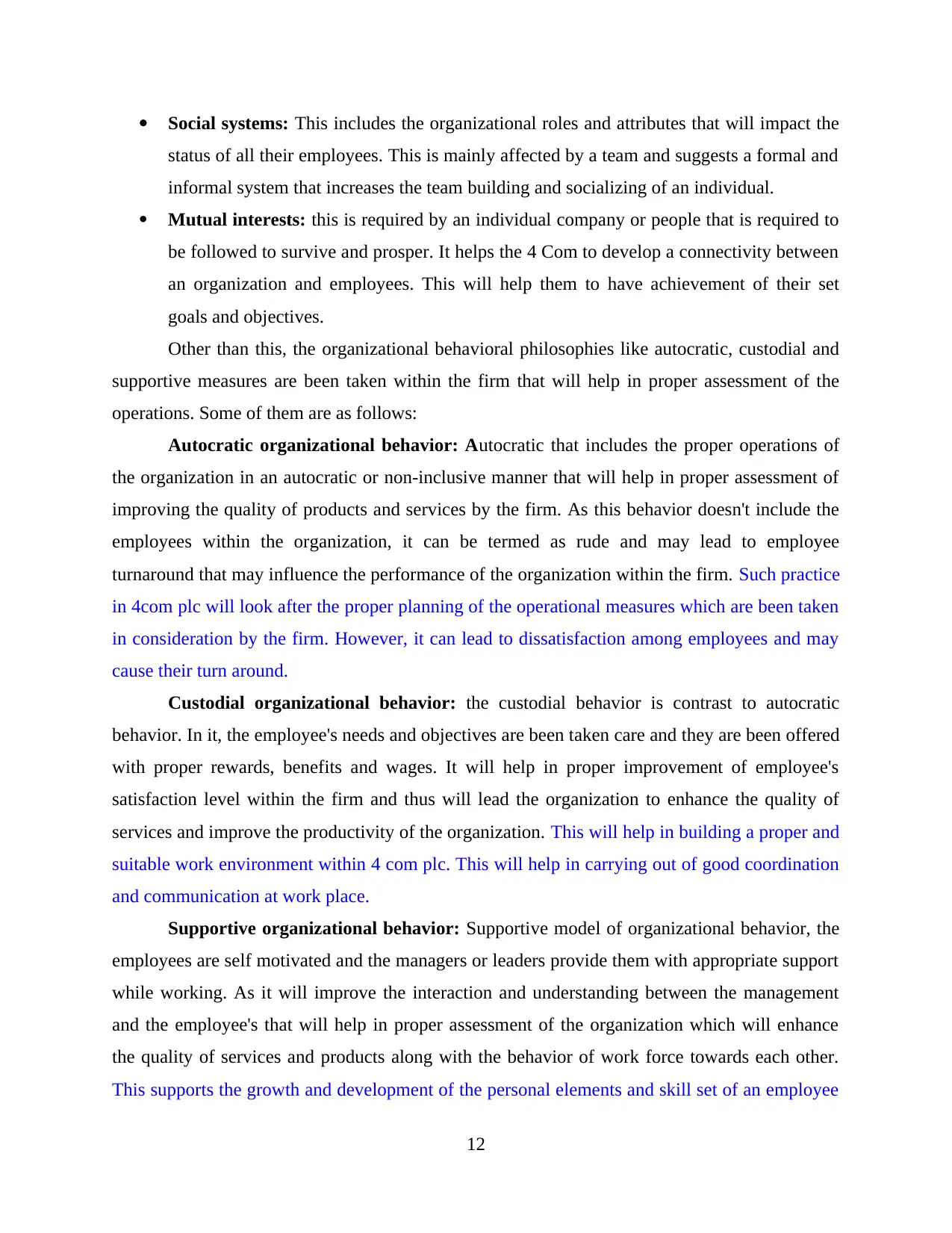
Social systems: This includes the organizational roles and attributes that will impact the
status of all their employees. This is mainly affected by a team and suggests a formal and
informal system that increases the team building and socializing of an individual.
Mutual interests: this is required by an individual company or people that is required to
be followed to survive and prosper. It helps the 4 Com to develop a connectivity between
an organization and employees. This will help them to have achievement of their set
goals and objectives.
Other than this, the organizational behavioral philosophies like autocratic, custodial and
supportive measures are been taken within the firm that will help in proper assessment of the
operations. Some of them are as follows:
Autocratic organizational behavior: Autocratic that includes the proper operations of
the organization in an autocratic or non-inclusive manner that will help in proper assessment of
improving the quality of products and services by the firm. As this behavior doesn't include the
employees within the organization, it can be termed as rude and may lead to employee
turnaround that may influence the performance of the organization within the firm. Such practice
in 4com plc will look after the proper planning of the operational measures which are been taken
in consideration by the firm. However, it can lead to dissatisfaction among employees and may
cause their turn around.
Custodial organizational behavior: the custodial behavior is contrast to autocratic
behavior. In it, the employee's needs and objectives are been taken care and they are been offered
with proper rewards, benefits and wages. It will help in proper improvement of employee's
satisfaction level within the firm and thus will lead the organization to enhance the quality of
services and improve the productivity of the organization. This will help in building a proper and
suitable work environment within 4 com plc. This will help in carrying out of good coordination
and communication at work place.
Supportive organizational behavior: Supportive model of organizational behavior, the
employees are self motivated and the managers or leaders provide them with appropriate support
while working. As it will improve the interaction and understanding between the management
and the employee's that will help in proper assessment of the organization which will enhance
the quality of services and products along with the behavior of work force towards each other.
This supports the growth and development of the personal elements and skill set of an employee
12
status of all their employees. This is mainly affected by a team and suggests a formal and
informal system that increases the team building and socializing of an individual.
Mutual interests: this is required by an individual company or people that is required to
be followed to survive and prosper. It helps the 4 Com to develop a connectivity between
an organization and employees. This will help them to have achievement of their set
goals and objectives.
Other than this, the organizational behavioral philosophies like autocratic, custodial and
supportive measures are been taken within the firm that will help in proper assessment of the
operations. Some of them are as follows:
Autocratic organizational behavior: Autocratic that includes the proper operations of
the organization in an autocratic or non-inclusive manner that will help in proper assessment of
improving the quality of products and services by the firm. As this behavior doesn't include the
employees within the organization, it can be termed as rude and may lead to employee
turnaround that may influence the performance of the organization within the firm. Such practice
in 4com plc will look after the proper planning of the operational measures which are been taken
in consideration by the firm. However, it can lead to dissatisfaction among employees and may
cause their turn around.
Custodial organizational behavior: the custodial behavior is contrast to autocratic
behavior. In it, the employee's needs and objectives are been taken care and they are been offered
with proper rewards, benefits and wages. It will help in proper improvement of employee's
satisfaction level within the firm and thus will lead the organization to enhance the quality of
services and improve the productivity of the organization. This will help in building a proper and
suitable work environment within 4 com plc. This will help in carrying out of good coordination
and communication at work place.
Supportive organizational behavior: Supportive model of organizational behavior, the
employees are self motivated and the managers or leaders provide them with appropriate support
while working. As it will improve the interaction and understanding between the management
and the employee's that will help in proper assessment of the organization which will enhance
the quality of services and products along with the behavior of work force towards each other.
This supports the growth and development of the personal elements and skill set of an employee
12
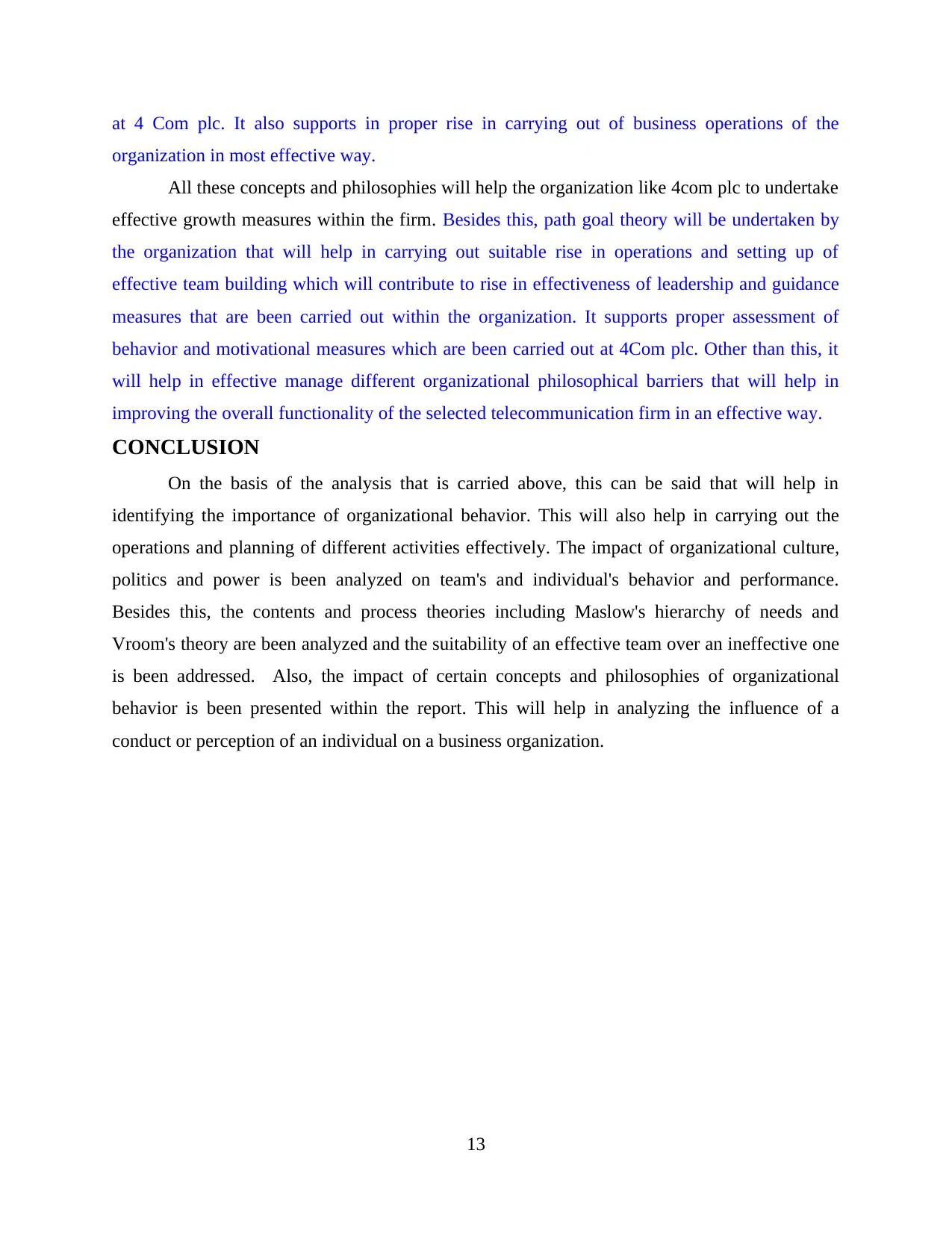
at 4 Com plc. It also supports in proper rise in carrying out of business operations of the
organization in most effective way.
All these concepts and philosophies will help the organization like 4com plc to undertake
effective growth measures within the firm. Besides this, path goal theory will be undertaken by
the organization that will help in carrying out suitable rise in operations and setting up of
effective team building which will contribute to rise in effectiveness of leadership and guidance
measures that are been carried out within the organization. It supports proper assessment of
behavior and motivational measures which are been carried out at 4Com plc. Other than this, it
will help in effective manage different organizational philosophical barriers that will help in
improving the overall functionality of the selected telecommunication firm in an effective way.
CONCLUSION
On the basis of the analysis that is carried above, this can be said that will help in
identifying the importance of organizational behavior. This will also help in carrying out the
operations and planning of different activities effectively. The impact of organizational culture,
politics and power is been analyzed on team's and individual's behavior and performance.
Besides this, the contents and process theories including Maslow's hierarchy of needs and
Vroom's theory are been analyzed and the suitability of an effective team over an ineffective one
is been addressed. Also, the impact of certain concepts and philosophies of organizational
behavior is been presented within the report. This will help in analyzing the influence of a
conduct or perception of an individual on a business organization.
13
organization in most effective way.
All these concepts and philosophies will help the organization like 4com plc to undertake
effective growth measures within the firm. Besides this, path goal theory will be undertaken by
the organization that will help in carrying out suitable rise in operations and setting up of
effective team building which will contribute to rise in effectiveness of leadership and guidance
measures that are been carried out within the organization. It supports proper assessment of
behavior and motivational measures which are been carried out at 4Com plc. Other than this, it
will help in effective manage different organizational philosophical barriers that will help in
improving the overall functionality of the selected telecommunication firm in an effective way.
CONCLUSION
On the basis of the analysis that is carried above, this can be said that will help in
identifying the importance of organizational behavior. This will also help in carrying out the
operations and planning of different activities effectively. The impact of organizational culture,
politics and power is been analyzed on team's and individual's behavior and performance.
Besides this, the contents and process theories including Maslow's hierarchy of needs and
Vroom's theory are been analyzed and the suitability of an effective team over an ineffective one
is been addressed. Also, the impact of certain concepts and philosophies of organizational
behavior is been presented within the report. This will help in analyzing the influence of a
conduct or perception of an individual on a business organization.
13
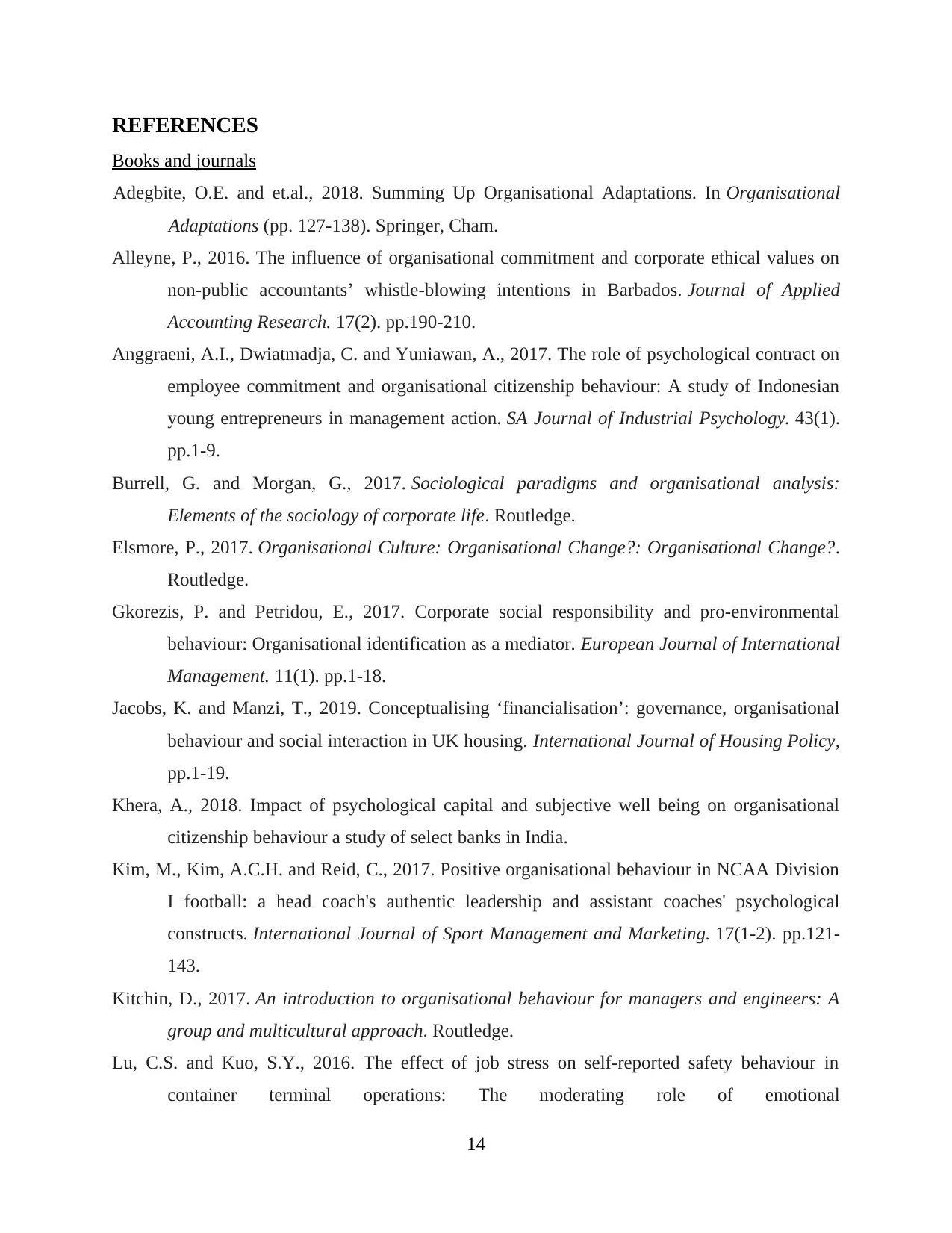
REFERENCES
Books and journals
Adegbite, O.E. and et.al., 2018. Summing Up Organisational Adaptations. In Organisational
Adaptations (pp. 127-138). Springer, Cham.
Alleyne, P., 2016. The influence of organisational commitment and corporate ethical values on
non-public accountants’ whistle-blowing intentions in Barbados. Journal of Applied
Accounting Research. 17(2). pp.190-210.
Anggraeni, A.I., Dwiatmadja, C. and Yuniawan, A., 2017. The role of psychological contract on
employee commitment and organisational citizenship behaviour: A study of Indonesian
young entrepreneurs in management action. SA Journal of Industrial Psychology. 43(1).
pp.1-9.
Burrell, G. and Morgan, G., 2017. Sociological paradigms and organisational analysis:
Elements of the sociology of corporate life. Routledge.
Elsmore, P., 2017. Organisational Culture: Organisational Change?: Organisational Change?.
Routledge.
Gkorezis, P. and Petridou, E., 2017. Corporate social responsibility and pro-environmental
behaviour: Organisational identification as a mediator. European Journal of International
Management. 11(1). pp.1-18.
Jacobs, K. and Manzi, T., 2019. Conceptualising ‘financialisation’: governance, organisational
behaviour and social interaction in UK housing. International Journal of Housing Policy,
pp.1-19.
Khera, A., 2018. Impact of psychological capital and subjective well being on organisational
citizenship behaviour a study of select banks in India.
Kim, M., Kim, A.C.H. and Reid, C., 2017. Positive organisational behaviour in NCAA Division
I football: a head coach's authentic leadership and assistant coaches' psychological
constructs. International Journal of Sport Management and Marketing. 17(1-2). pp.121-
143.
Kitchin, D., 2017. An introduction to organisational behaviour for managers and engineers: A
group and multicultural approach. Routledge.
Lu, C.S. and Kuo, S.Y., 2016. The effect of job stress on self-reported safety behaviour in
container terminal operations: The moderating role of emotional
14
Books and journals
Adegbite, O.E. and et.al., 2018. Summing Up Organisational Adaptations. In Organisational
Adaptations (pp. 127-138). Springer, Cham.
Alleyne, P., 2016. The influence of organisational commitment and corporate ethical values on
non-public accountants’ whistle-blowing intentions in Barbados. Journal of Applied
Accounting Research. 17(2). pp.190-210.
Anggraeni, A.I., Dwiatmadja, C. and Yuniawan, A., 2017. The role of psychological contract on
employee commitment and organisational citizenship behaviour: A study of Indonesian
young entrepreneurs in management action. SA Journal of Industrial Psychology. 43(1).
pp.1-9.
Burrell, G. and Morgan, G., 2017. Sociological paradigms and organisational analysis:
Elements of the sociology of corporate life. Routledge.
Elsmore, P., 2017. Organisational Culture: Organisational Change?: Organisational Change?.
Routledge.
Gkorezis, P. and Petridou, E., 2017. Corporate social responsibility and pro-environmental
behaviour: Organisational identification as a mediator. European Journal of International
Management. 11(1). pp.1-18.
Jacobs, K. and Manzi, T., 2019. Conceptualising ‘financialisation’: governance, organisational
behaviour and social interaction in UK housing. International Journal of Housing Policy,
pp.1-19.
Khera, A., 2018. Impact of psychological capital and subjective well being on organisational
citizenship behaviour a study of select banks in India.
Kim, M., Kim, A.C.H. and Reid, C., 2017. Positive organisational behaviour in NCAA Division
I football: a head coach's authentic leadership and assistant coaches' psychological
constructs. International Journal of Sport Management and Marketing. 17(1-2). pp.121-
143.
Kitchin, D., 2017. An introduction to organisational behaviour for managers and engineers: A
group and multicultural approach. Routledge.
Lu, C.S. and Kuo, S.Y., 2016. The effect of job stress on self-reported safety behaviour in
container terminal operations: The moderating role of emotional
14
Secure Best Marks with AI Grader
Need help grading? Try our AI Grader for instant feedback on your assignments.
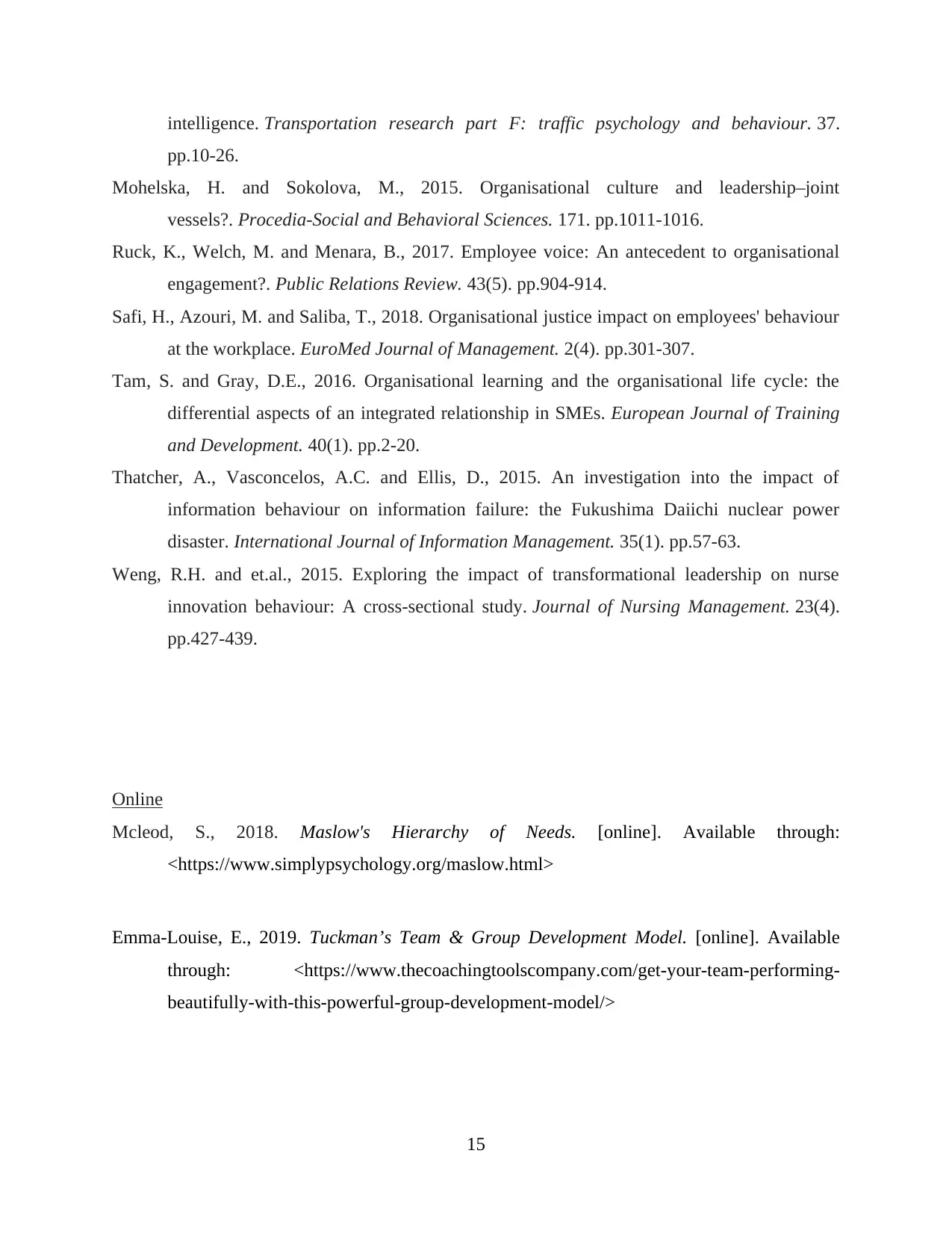
intelligence. Transportation research part F: traffic psychology and behaviour. 37.
pp.10-26.
Mohelska, H. and Sokolova, M., 2015. Organisational culture and leadership–joint
vessels?. Procedia-Social and Behavioral Sciences. 171. pp.1011-1016.
Ruck, K., Welch, M. and Menara, B., 2017. Employee voice: An antecedent to organisational
engagement?. Public Relations Review. 43(5). pp.904-914.
Safi, H., Azouri, M. and Saliba, T., 2018. Organisational justice impact on employees' behaviour
at the workplace. EuroMed Journal of Management. 2(4). pp.301-307.
Tam, S. and Gray, D.E., 2016. Organisational learning and the organisational life cycle: the
differential aspects of an integrated relationship in SMEs. European Journal of Training
and Development. 40(1). pp.2-20.
Thatcher, A., Vasconcelos, A.C. and Ellis, D., 2015. An investigation into the impact of
information behaviour on information failure: the Fukushima Daiichi nuclear power
disaster. International Journal of Information Management. 35(1). pp.57-63.
Weng, R.H. and et.al., 2015. Exploring the impact of transformational leadership on nurse
innovation behaviour: A cross‐sectional study. Journal of Nursing Management. 23(4).
pp.427-439.
Online
Mcleod, S., 2018. Maslow's Hierarchy of Needs. [online]. Available through:
<https://www.simplypsychology.org/maslow.html>
Emma-Louise, E., 2019. Tuckman’s Team & Group Development Model. [online]. Available
through: <https://www.thecoachingtoolscompany.com/get-your-team-performing-
beautifully-with-this-powerful-group-development-model/>
15
pp.10-26.
Mohelska, H. and Sokolova, M., 2015. Organisational culture and leadership–joint
vessels?. Procedia-Social and Behavioral Sciences. 171. pp.1011-1016.
Ruck, K., Welch, M. and Menara, B., 2017. Employee voice: An antecedent to organisational
engagement?. Public Relations Review. 43(5). pp.904-914.
Safi, H., Azouri, M. and Saliba, T., 2018. Organisational justice impact on employees' behaviour
at the workplace. EuroMed Journal of Management. 2(4). pp.301-307.
Tam, S. and Gray, D.E., 2016. Organisational learning and the organisational life cycle: the
differential aspects of an integrated relationship in SMEs. European Journal of Training
and Development. 40(1). pp.2-20.
Thatcher, A., Vasconcelos, A.C. and Ellis, D., 2015. An investigation into the impact of
information behaviour on information failure: the Fukushima Daiichi nuclear power
disaster. International Journal of Information Management. 35(1). pp.57-63.
Weng, R.H. and et.al., 2015. Exploring the impact of transformational leadership on nurse
innovation behaviour: A cross‐sectional study. Journal of Nursing Management. 23(4).
pp.427-439.
Online
Mcleod, S., 2018. Maslow's Hierarchy of Needs. [online]. Available through:
<https://www.simplypsychology.org/maslow.html>
Emma-Louise, E., 2019. Tuckman’s Team & Group Development Model. [online]. Available
through: <https://www.thecoachingtoolscompany.com/get-your-team-performing-
beautifully-with-this-powerful-group-development-model/>
15
1 out of 17
Related Documents
Your All-in-One AI-Powered Toolkit for Academic Success.
+13062052269
info@desklib.com
Available 24*7 on WhatsApp / Email
![[object Object]](/_next/static/media/star-bottom.7253800d.svg)
Unlock your academic potential
© 2024 | Zucol Services PVT LTD | All rights reserved.





